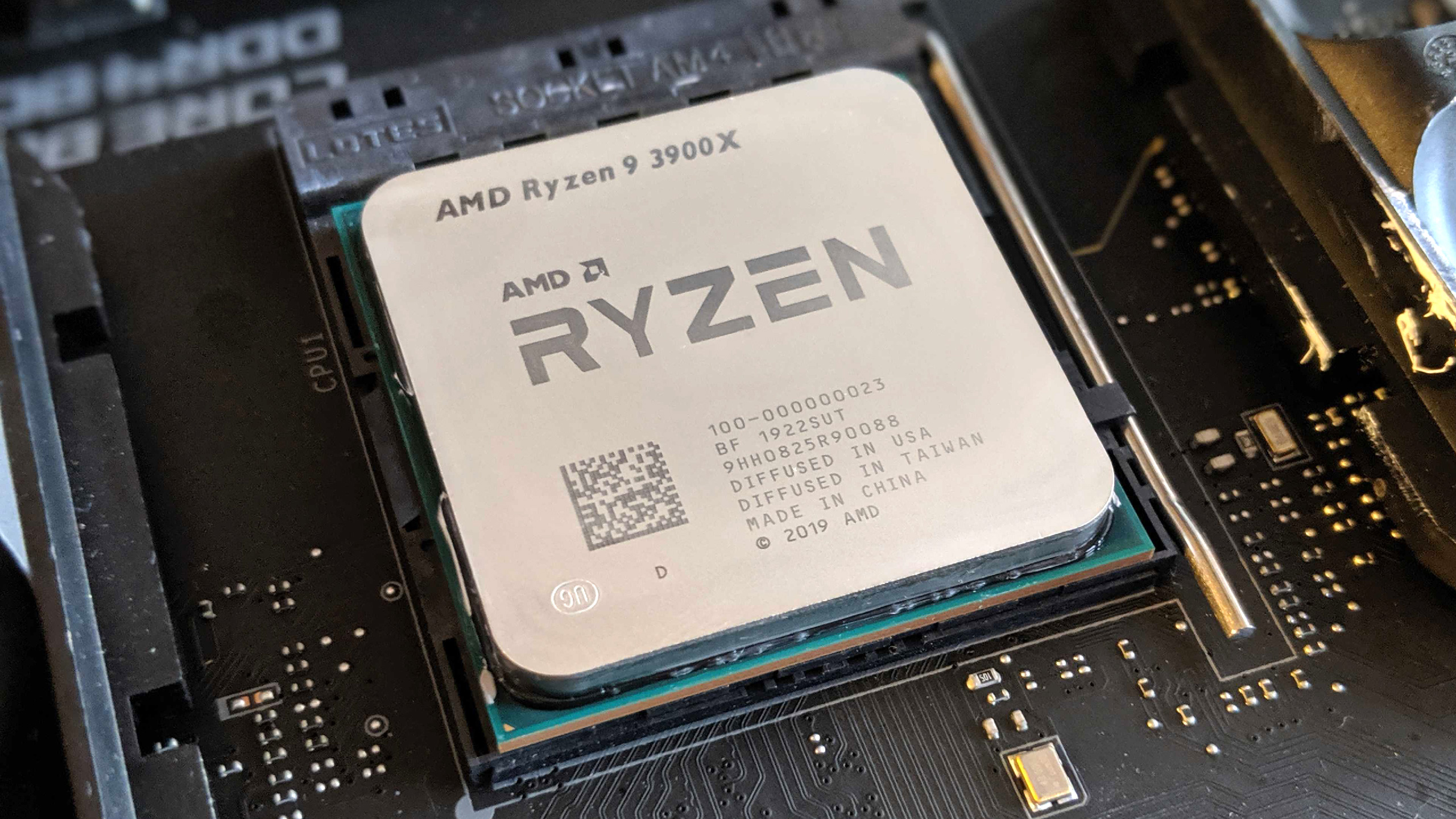Our Verdict
The Ryzen 9 3900X is easily the most compelling enthusiast CPU from AMD in the past 15 years. It can do everything you need and then some, even if it's marginally slower in some games.
For
- 50 percent more cores
- Fast and efficient architecture
- PCIe Gen4 and 7nm
Against
- Most apps don't need 12 cores
- Technically a bit slower in games
- Weak overclocking potential
PC Gamer's got your back
The buildup to AMD's launch party for its Ryzen 3000 CPUs, aka third gen Ryzen, aka Zen 2, has been huge. The Ryzen 3000 processors are the first mainstream CPUs to utilize a 7nm manufacturing process. After flirting with the crown for the first two Ryzen generations, this could be the day when AMD claims an outright victory. Will the Ryzen 9 3900X be the best CPU for gaming—and everything else? It's time to find out.
I've already done a deep dive into the Ryzen 3000 and Zen 2 architectural updates. That's 3,000 words of primer for the interested, so start there if you want to know the nitty gritty details of why things have changed. This is also the final scored review after an initial review in progress—AMD has been working on updated firmware, and I've tested and retested the 3900X multiple times. What you see here represents a realistic look at the performance you'll get.
The focus here will be on the Ryzen 9 3900X, though the 3700X and 3600X are also included in the performance slides. Let's start with the high-level overview before moving on to the real-world performance results. The short summary of changes for the Zen 2 architecture is still quite extensive.
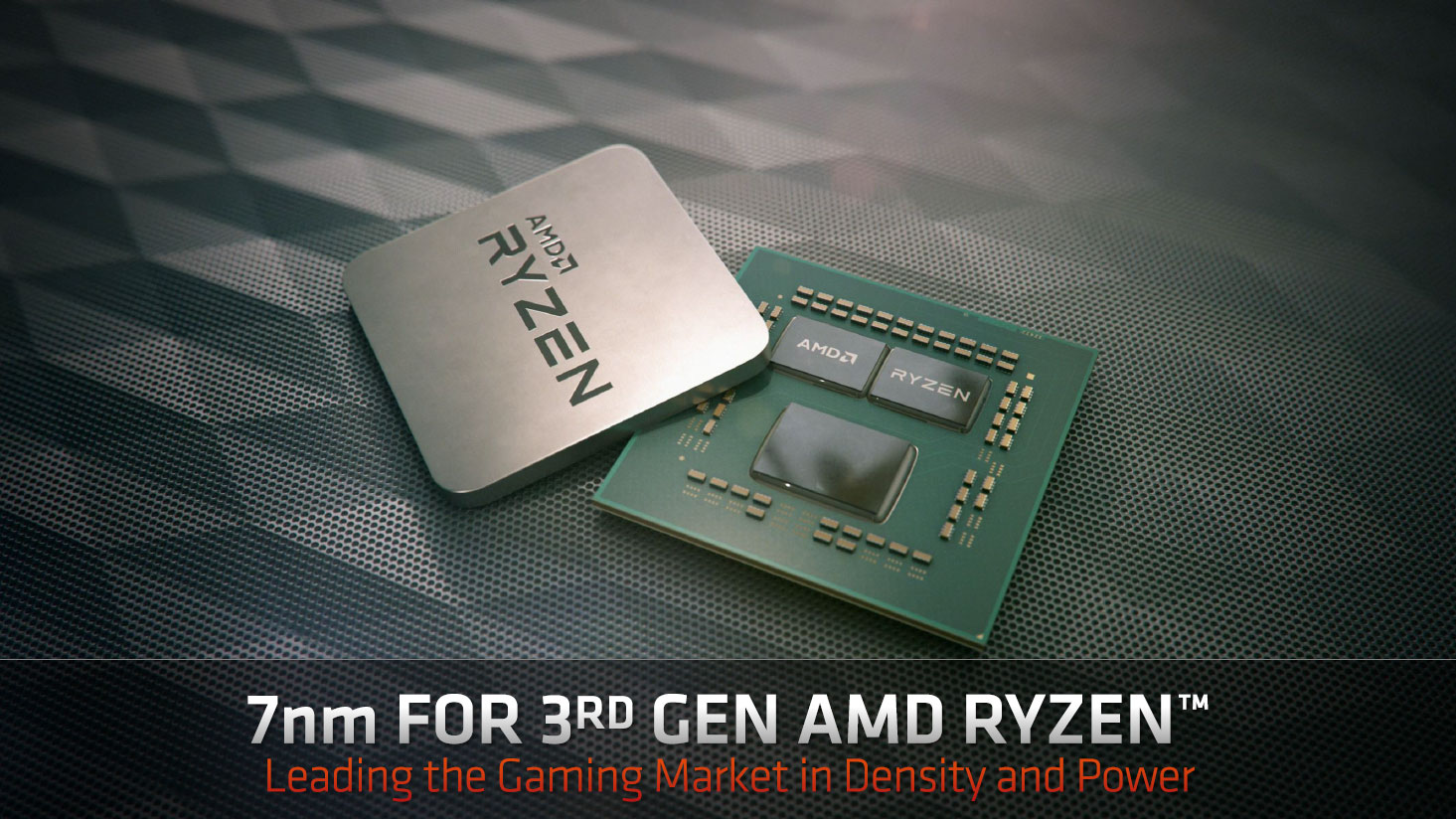
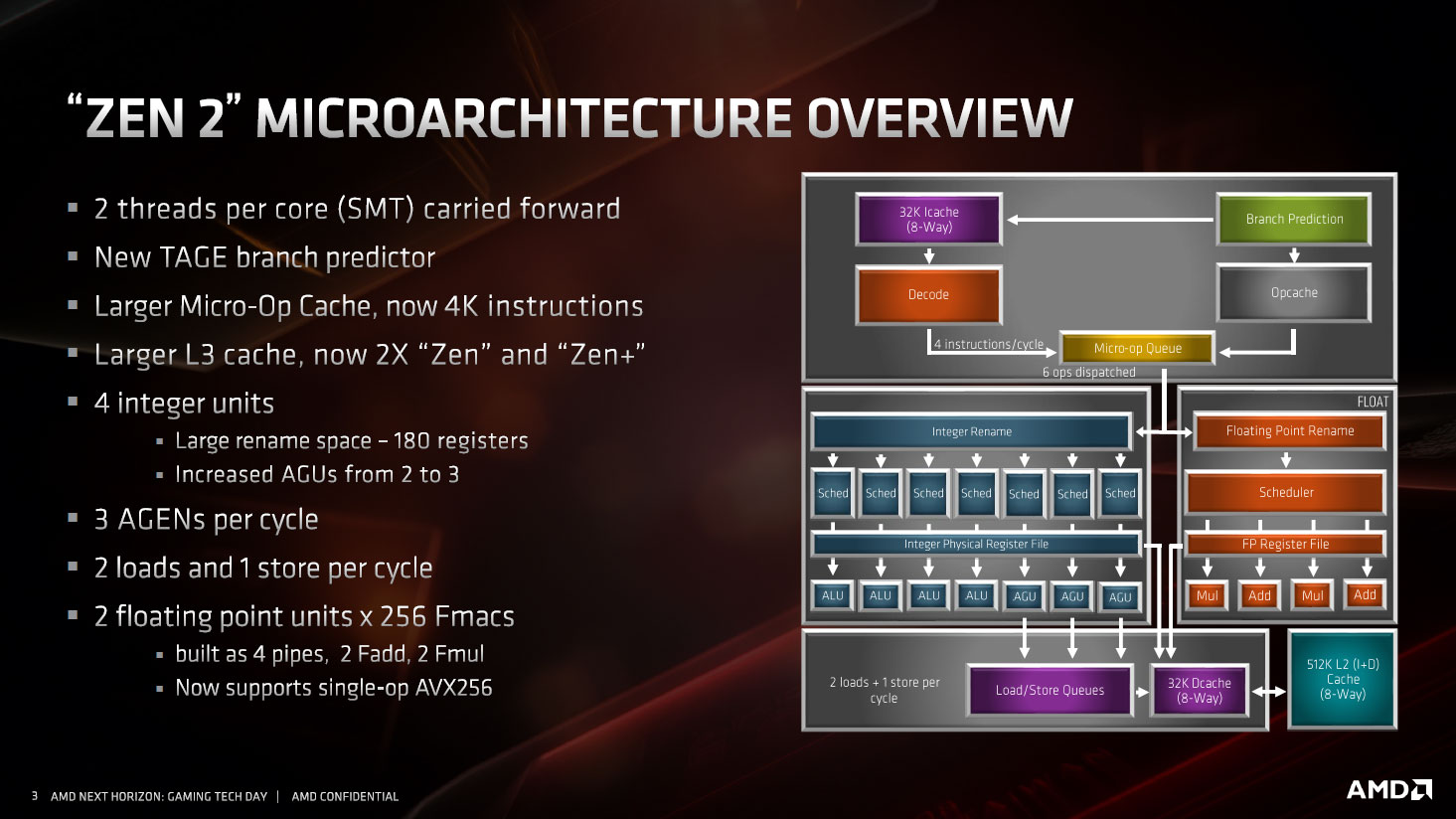

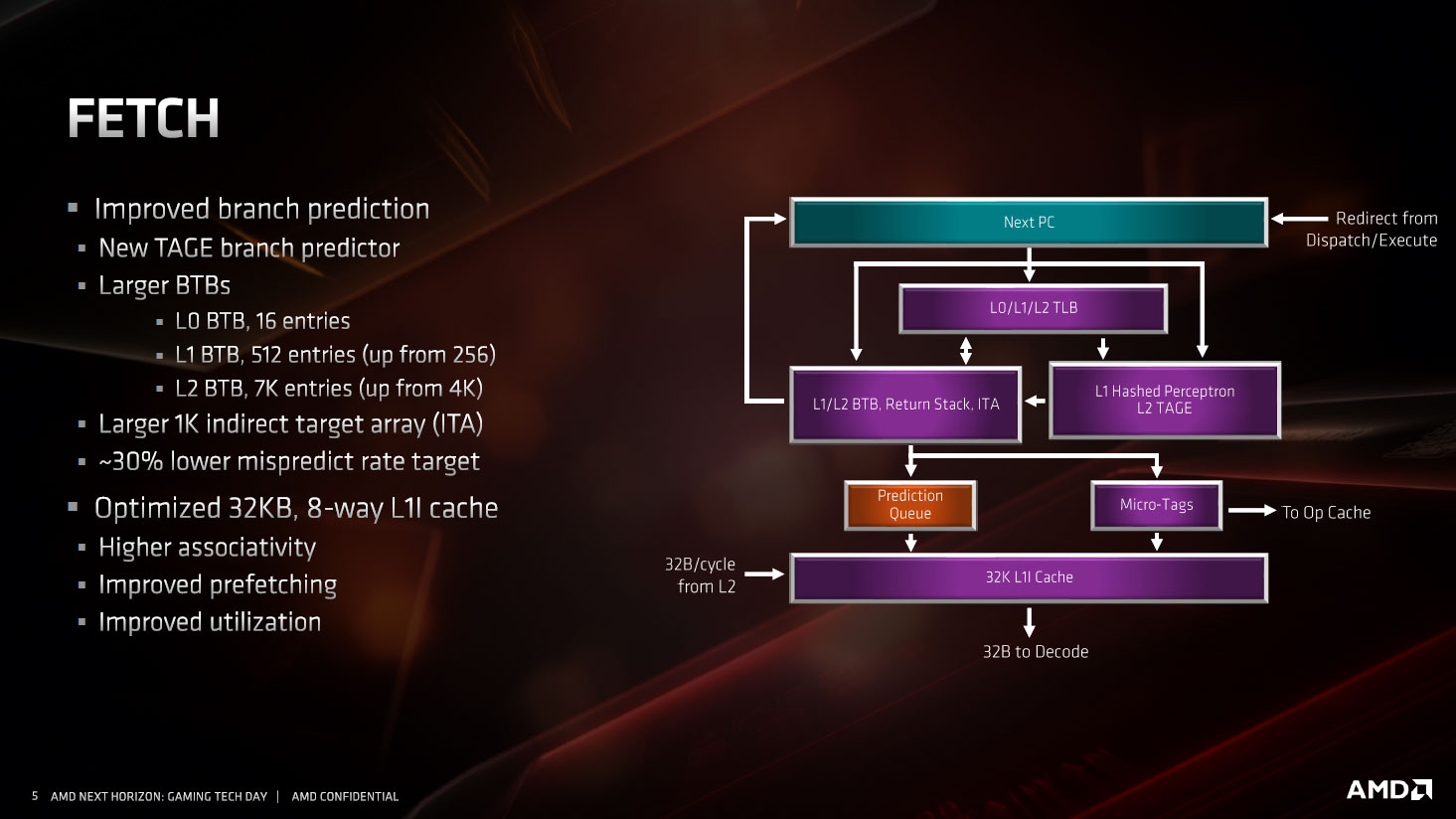
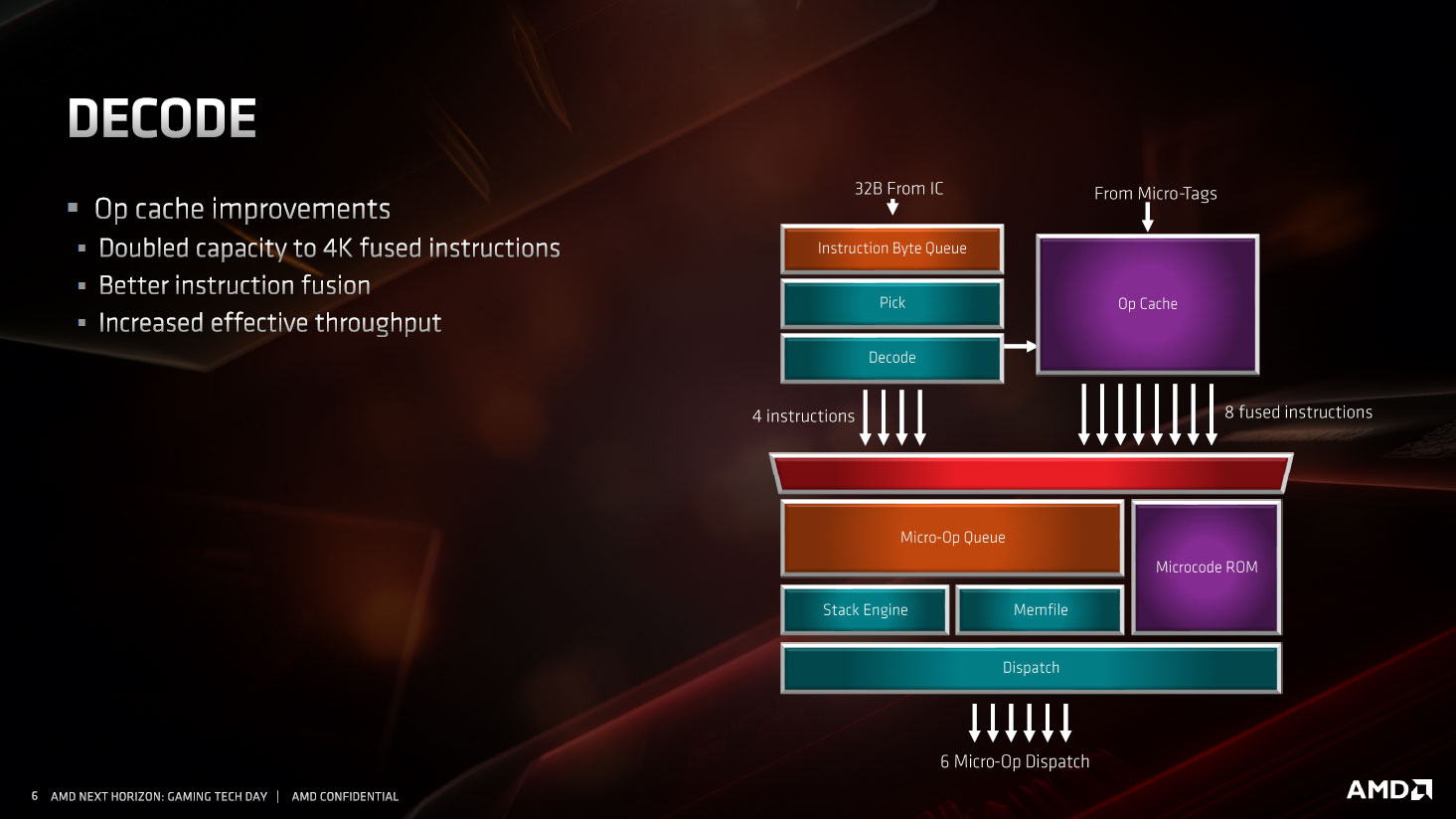
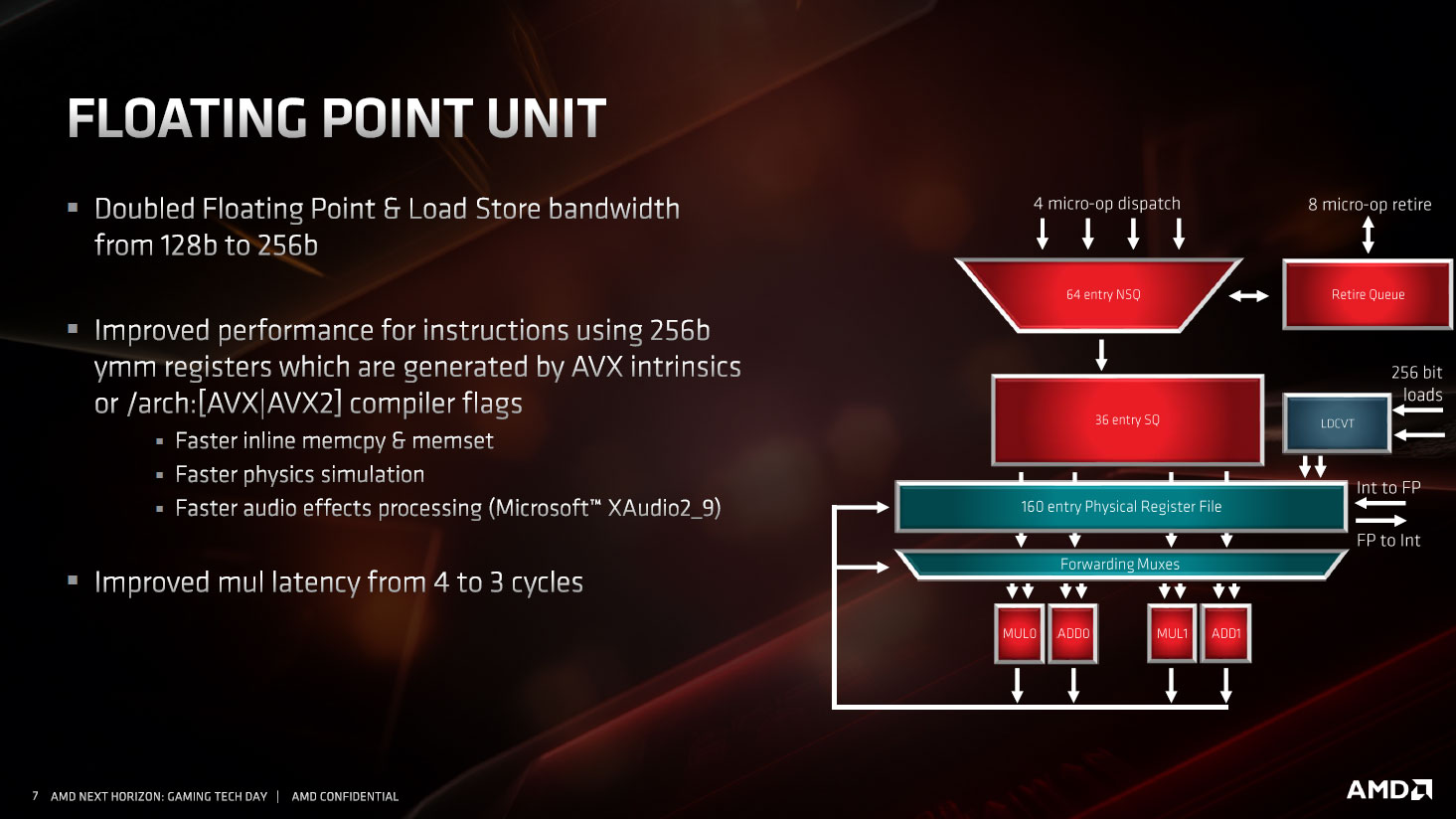
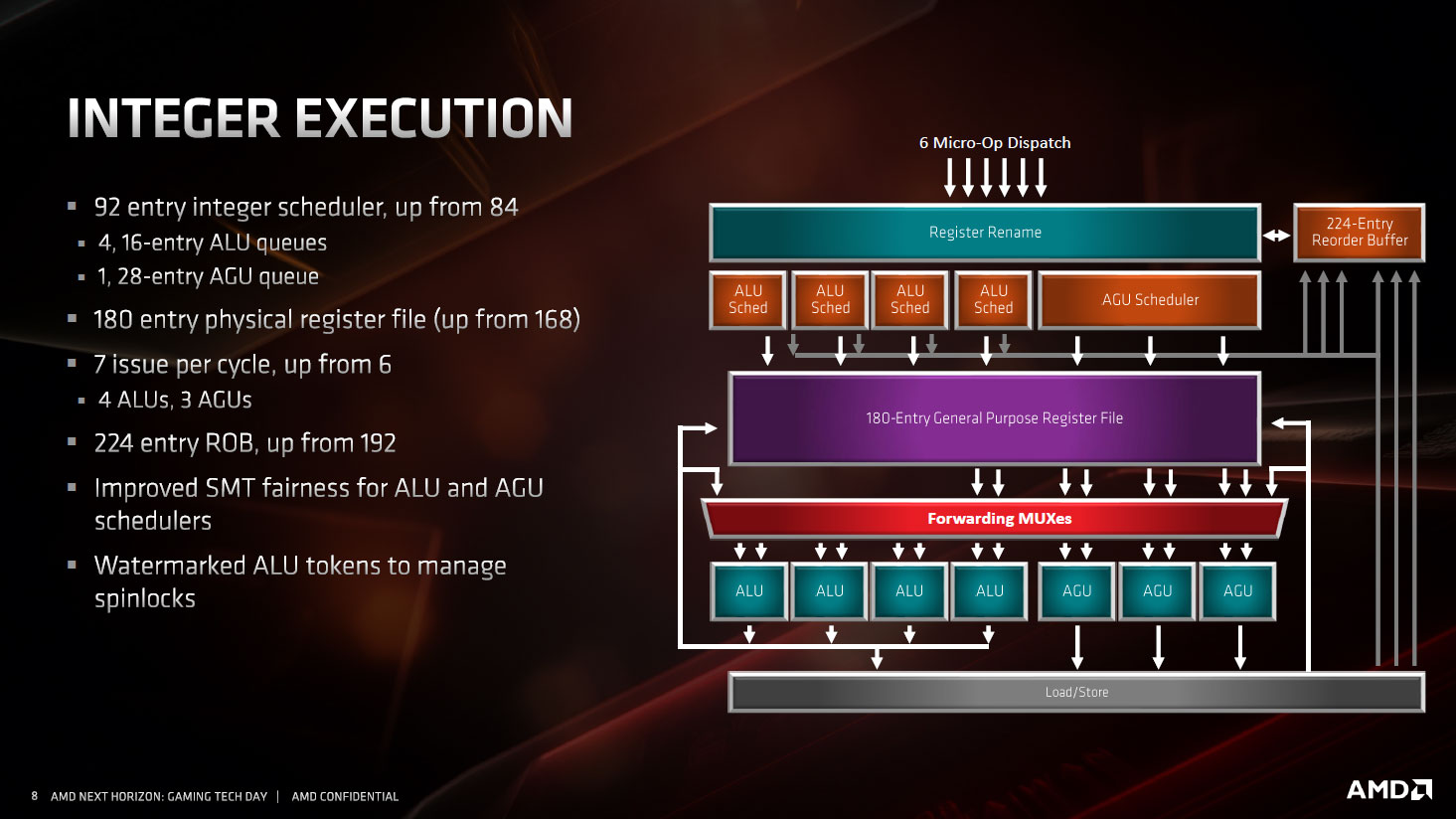
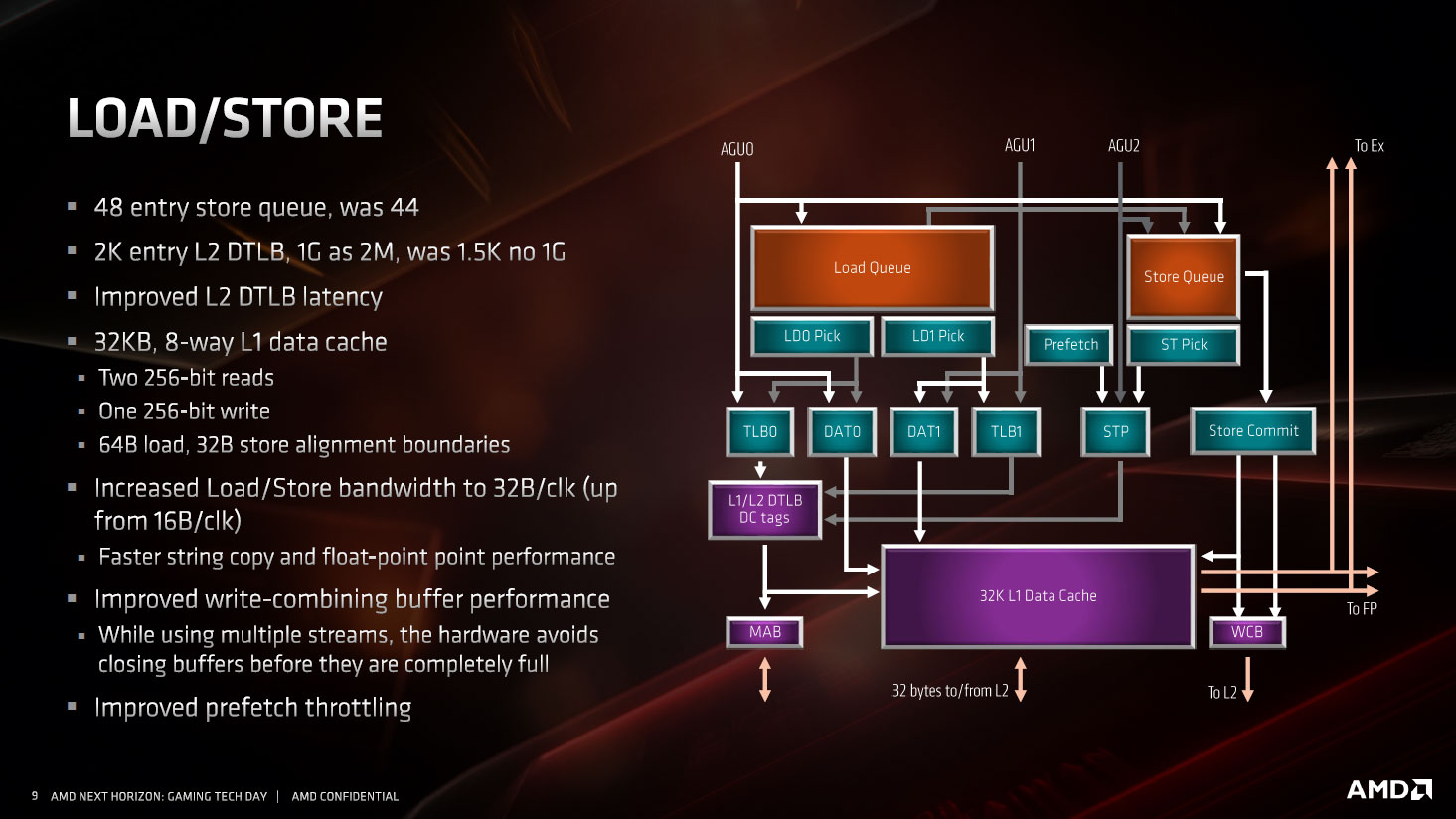
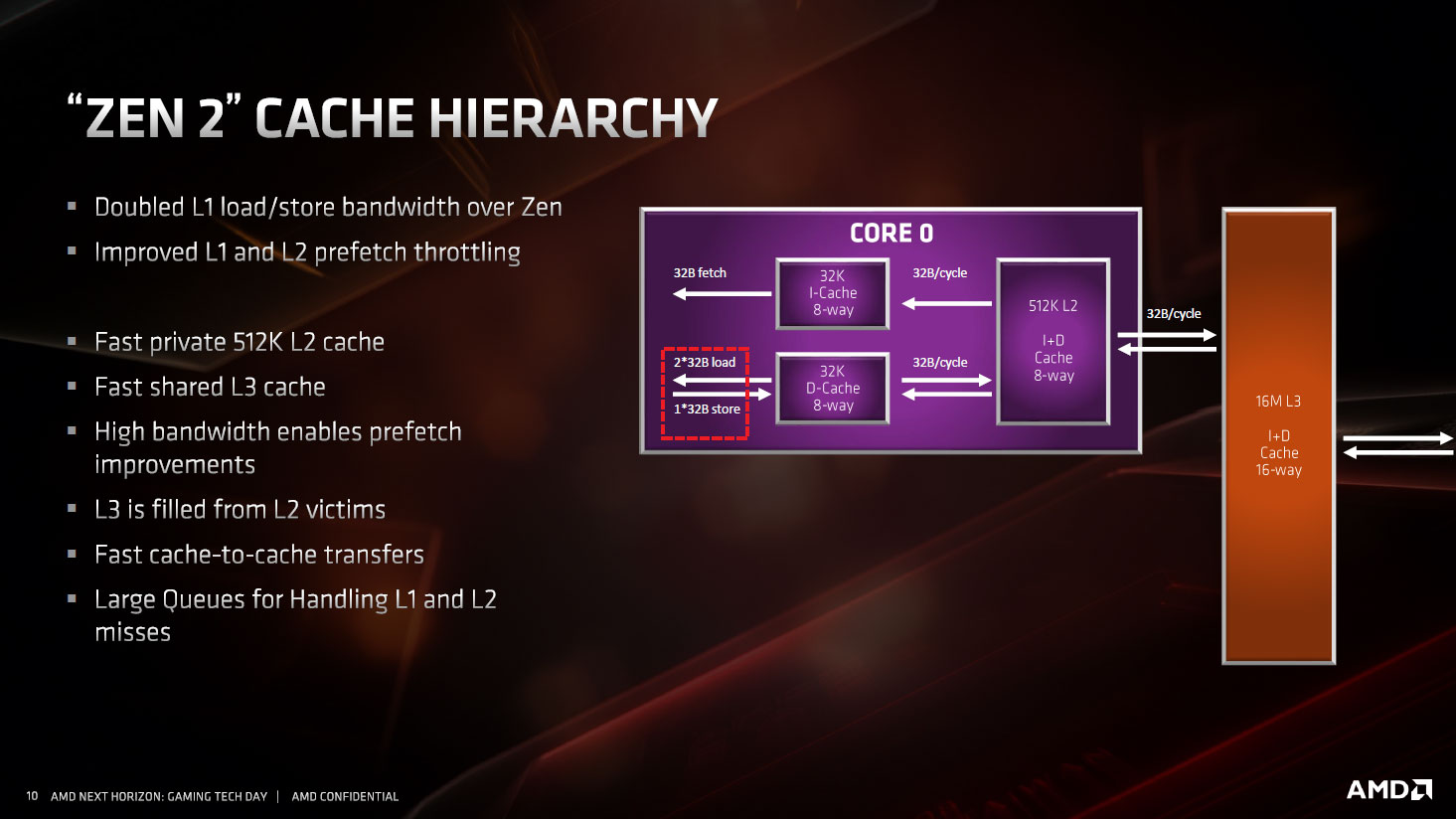
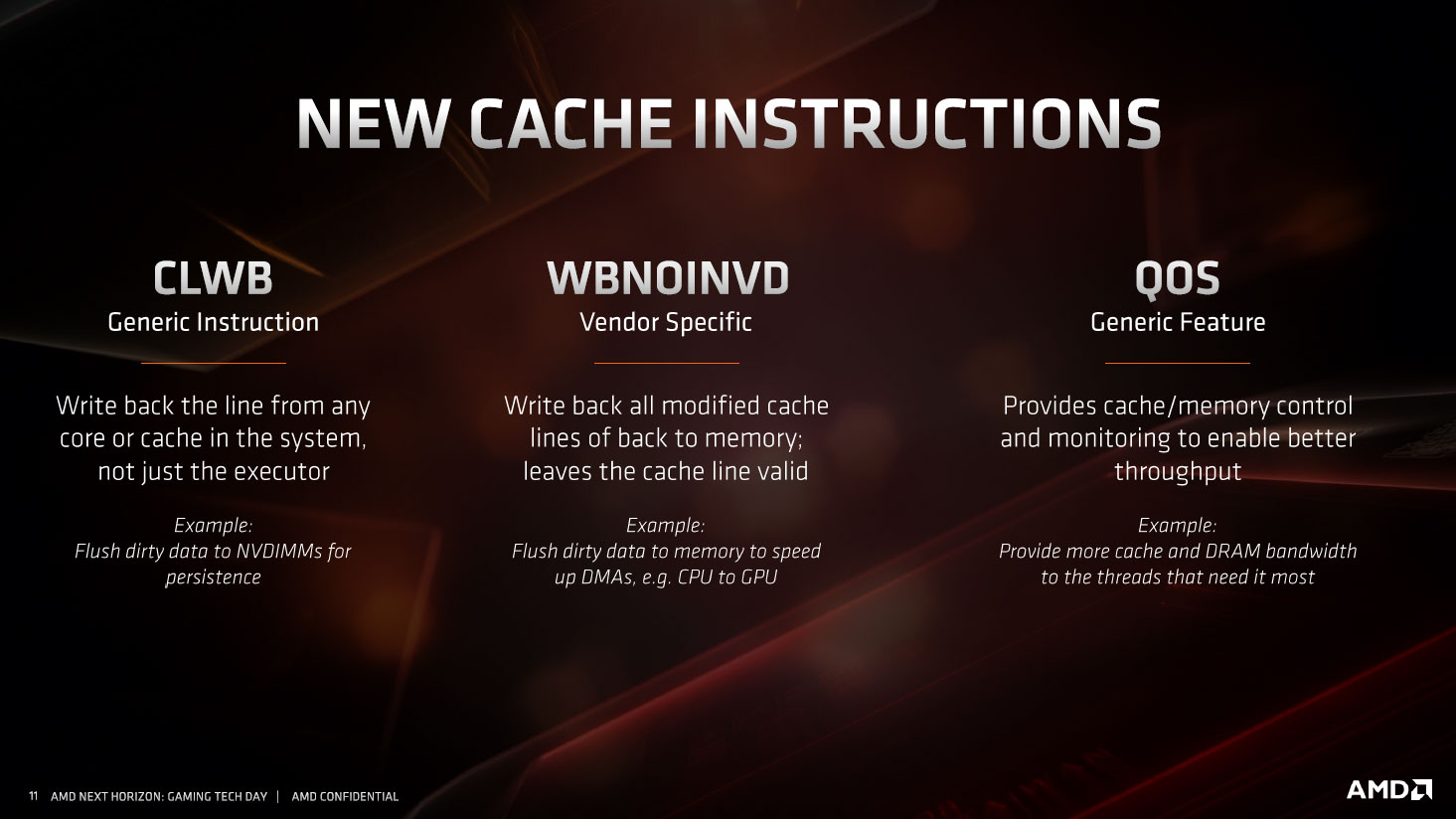
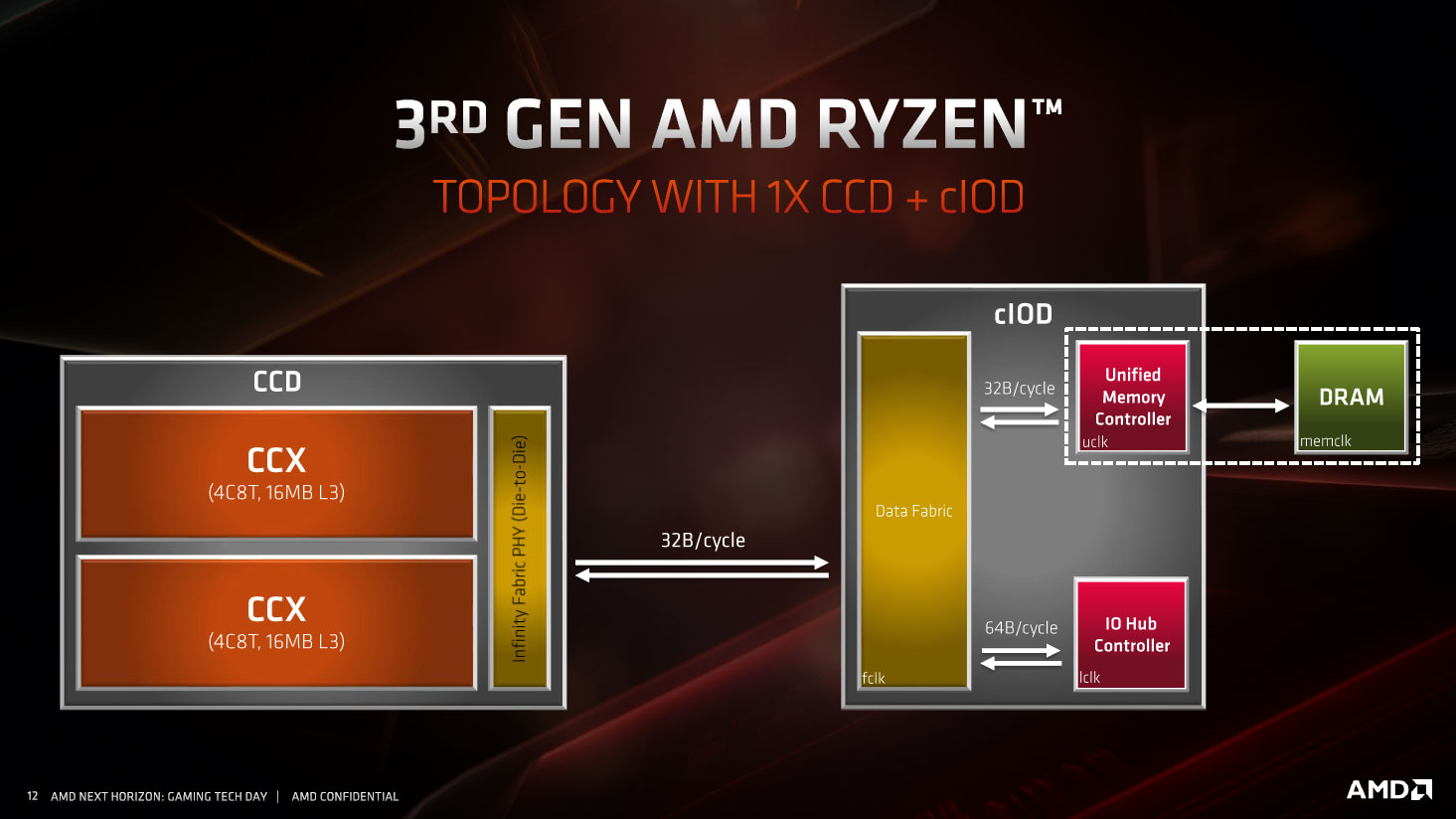
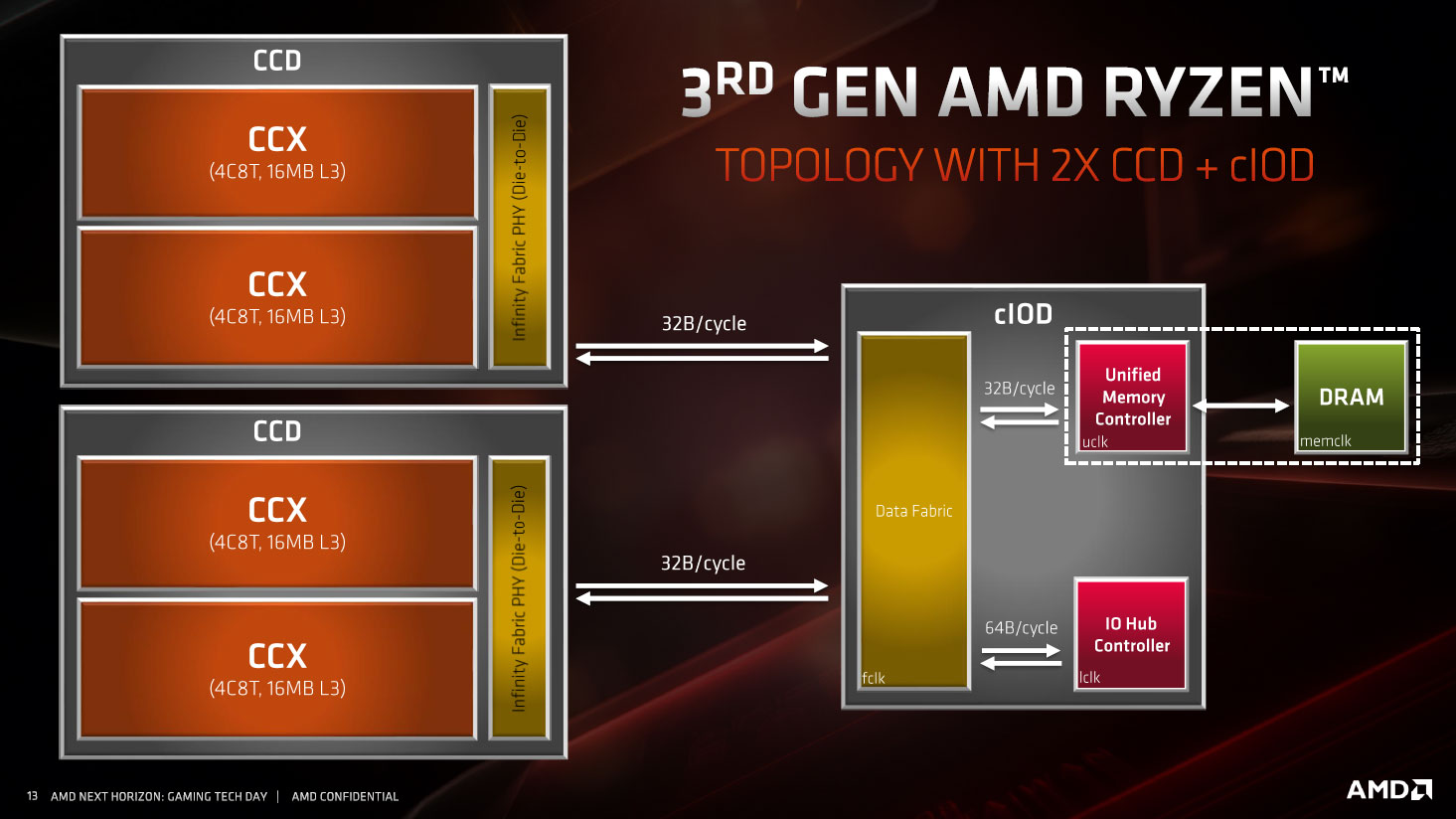
Zen 2 adds an improved L2 TAGE branch predictor, a larger micro-op cache, doubles the maximum size of the L3 cache (to 32MB per CCX), and doubles the AVX floating point performance. There's also a third address generation unit (AGU), larger buffers (eg, reorder buffer, integer scheduler, physical register file, entry store queue, and more), multiplication latency is reduced to 3 cycles (from 4), and there are wider buses (256-bit instead of 128-bit) to improve bandwidth. There's also PCIe Gen4 support, changes to the Infinity Fabric that links everything together, and improvements in memory compatibility.
Wrap all of that up in a 7nm bow, then move the memory controller out of the main CPU chiplet and into a secondary IO chiplet, and stick both into a single package—with the option to have dual CPU chiplets on higher tier models like the 3900X. That's the Ryzen 3000 family, currently with everything from 6-core/12-thread models like the Ryzen 5 3600 that use a single CPU chiplet with two CCXes, up through the current king of the hill Ryzen 9 3900X with 12-cores and 24-threads spread out over two CPU chiplets—and the Ryzen 9 3950X will be a 16-core/32-thread solution, coming soon. (I hope to have one for testing in the near future.)
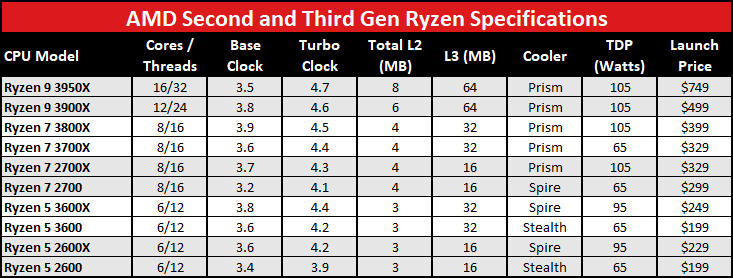
Looking at the specs for the new third gen parts compared to the previous generation parts, the main changes are in L3 cache sizes and clockspeeds, as well as pricing. That last bit is especially relevant if we're looking at street pricing, where the second gen parts are now selling for far less than the original launch prices—the Ryzen 7 2700X costs $240, the 2700 is $184, 2600X goes for $145, and the Ryzen 5 2600 is budget priced at only $129. The new 3000 series parts meanwhile all sell for MSRP, if not slightly more, and the 3900X has been in and out of stock since launch. (There's a reason for that.)
There's a bit of fuzziness, even now, over the turbo clocks. Will you always see 4.6GHz in singlethreaded workloads on the 3900X? Probably not. Still, there's another firmware update coming (AGESA 1003ABBA—sing it with me: Dancing Queen…), which may slightly improve performance. In practice, a potential 50-100MHz bump in clockspeed for singlethreaded workloads won't make much of a difference, and other firmware changes may actually drop performance.
The big question is how third gen Ryzen performs, and in particular the 12-core/24-thread Ryzen 9 3900X. More cores and threads should give it a decisive lead over Intel's consumer parts (ie, the 9th Gen Core i7-9700K and Core i9-9900K) when it comes to multithreaded apps, but we're particularly interested in seeing if AMD can truly close the gap with Intel when it comes to gaming performance.
AMD has been more than willing to sell users more cores and threads at lower prices than Intel, and in turn that forced Intel to step up from 4-core/8-thread mainstream CPUs like the i7-7700K and finally start offering 6-core/12-thread and 8-core/16-thread models without forcing users onto the 'enthusiast' X299 platform. It's a good thing, too, as X299 often ends up performing quite a bit worse than Z390/Z370 when it comes to games. That's because the more complex HEDT (high-end desktop) platforms end up increasing the latency of certain operations, and games are often very sensitive to such latencies.
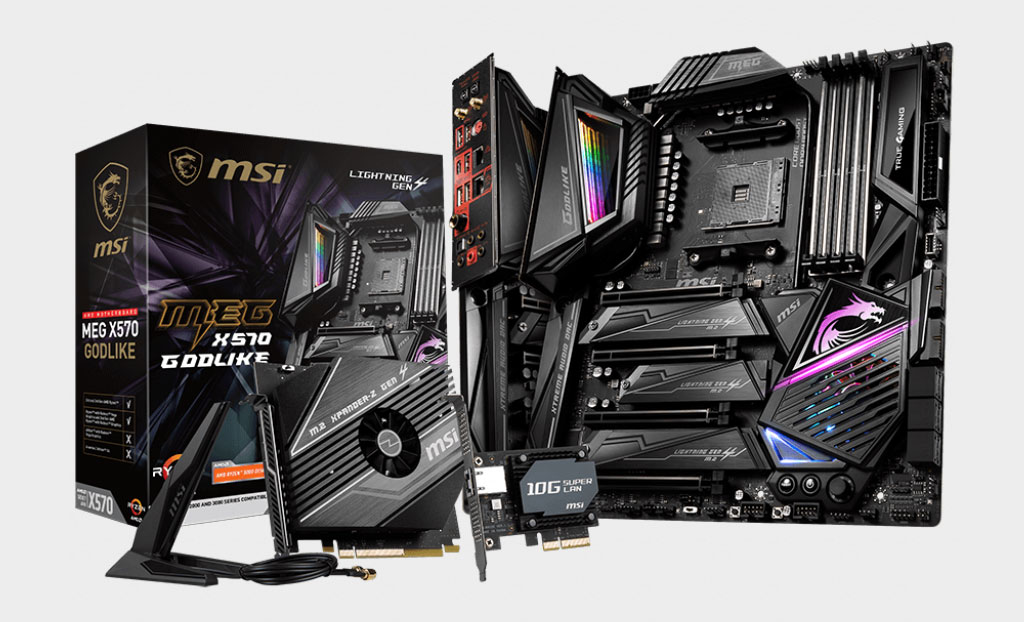
Let me set the stage for all the testing that goes into these articles first. After the release of the Windows 10 May 2019 update, I retested every processor you'll see in charts. That ensured every PC is on equal footing. I also added some new benchmarks and ditched some old ones, and swapped to the RTX 2080 Ti, currently the fastest consumer graphics card when it comes to gaming (I don't include Titan cards), to provide the highest potential for differences in CPU performance to show up in the gaming benchmarks. In total, I've tested over 20 CPUs across seven different platforms, doing my best to minimize differences that might affect performance.
That means using 16GB of fast DDR4-3200 CL14 memory for all the mainstream platforms—but AMD's Threadripper and Intel's X299 platforms were tested with 32GB of DDR4-3200 CL14 memory (because they're quad-channel and I didn't have 4x4GB kits available). All the newer platforms also use an M.2 NVMe SSD for a boot drive, though it's not the same drive on every system (which shouldn't matter as none of the tests are storage intensive). Games are run from a secondary SATA SSD, and again storage performance isn't a major factor.
I didn't do extensive overclocking tests, and for the Ryzen X-series parts that's because the gains are often negligible. You often lower the singlethreaded clockspeed to get a 100-200MHz boost in multithreaded workloads. The 3900X and 3700X are already running pretty close to maximum performance, and even enabling Precision Boost Overdrive (to potentially get an extra 200MHz with adequate cooling), I didn't see any notable improvements in performance.
I also didn't test every AMD Ryzen CPU on the same motherboard—you can't run first gen Ryzen in an X570 board, and oddly, I also had trouble getting my second gen Ryzen parts to work in the MSI MEG X570 Godlike board as it appears to need some additional firmware tuning. While it's possible, running third gen Ryzen in an X370 or X470 board doesn't make sense as we're evaluating the latest and greatest tech. And the Ryzen 3000 CPUs are definitely AMD's latest and greatest.
For this first round of testing, all of AMD's third gen parts, including the Ryzen 9 3900X, have been tested in the MSI MEG X570 Godlike board. (I also tested the 3900X in Asus and Gigabyte boards, and the results are largely the same). The memory for the new Ryzen 3000 processors is 16GB G.Skill TridentZ RGB DDR4-3200 CL14 (which ended up performing slightly better than the DDR4-3600 CL16 memory AMD shipped me). We've also got a Gigabyte Aorus NVMe Gen4 2TB SSD for the main drive (another part of the AMD review kit), with a GeForce RTX 2080 Ti Founders Edition graphics card.
Ryzen 9 3900X gaming performance
Here's what performance looks like, starting with gaming. All ten games are tested at 1080p 'ultra' (generally the highest possible settings, outside of super-sample anti-aliasing), and each test is run multiple times to ensure the consistency of results. Minimum fps is calculated as the average fps for the bottom three percent of frametimes—find the 97 percentile frametime, and sum up all frametimes above that, dividing by the number of frames. This provides a more useful metric than pure minimum fps or pure 97 percentile.
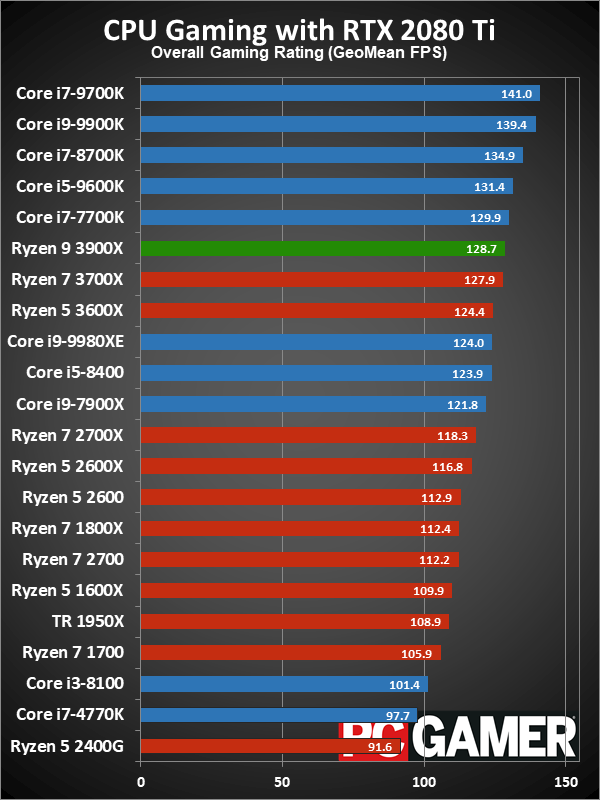
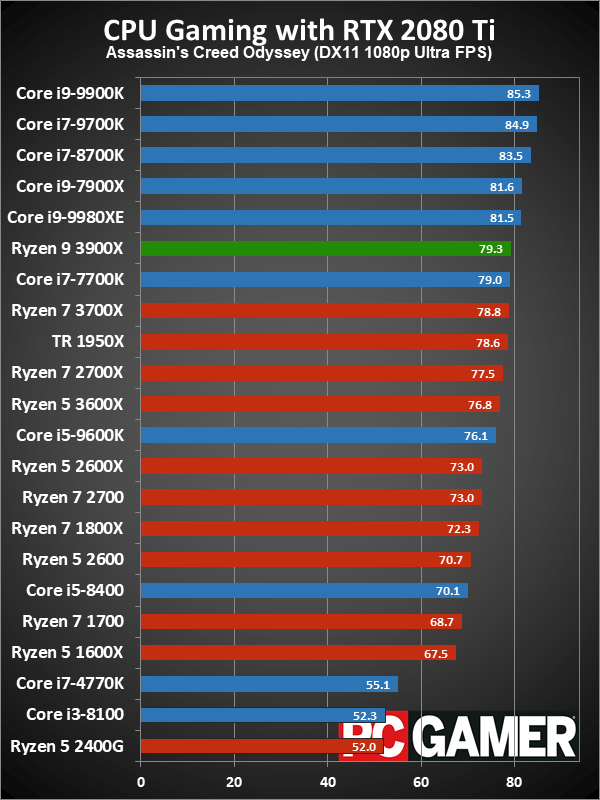
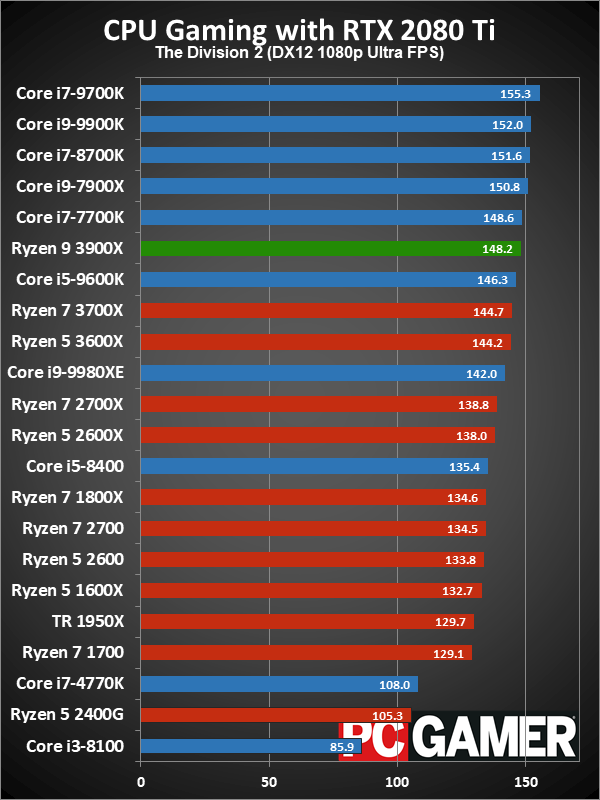
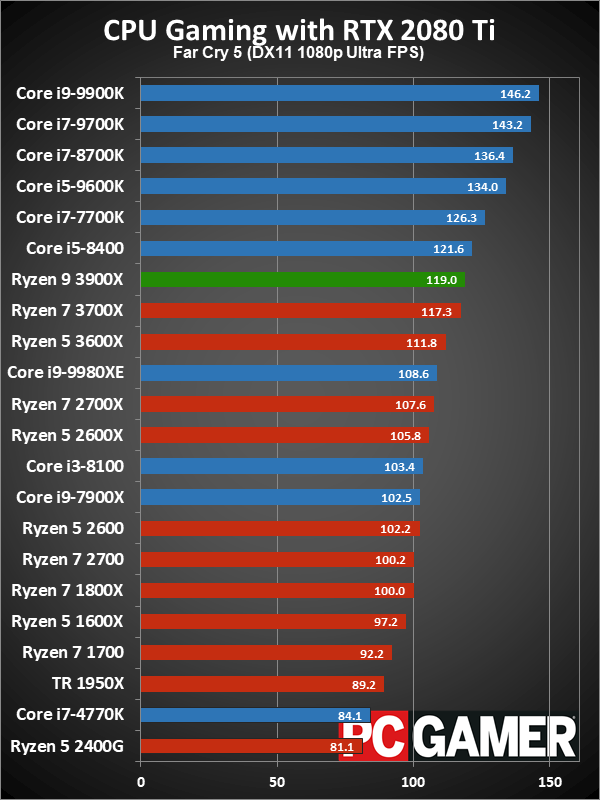
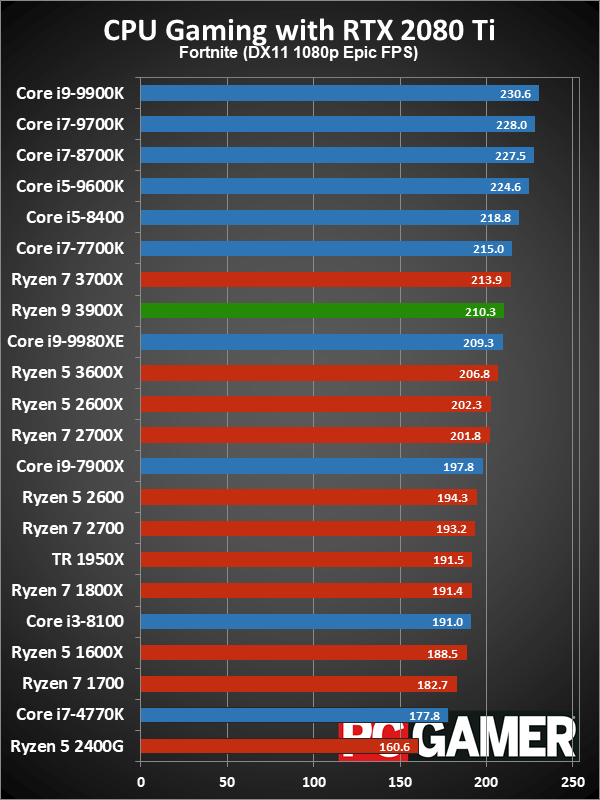
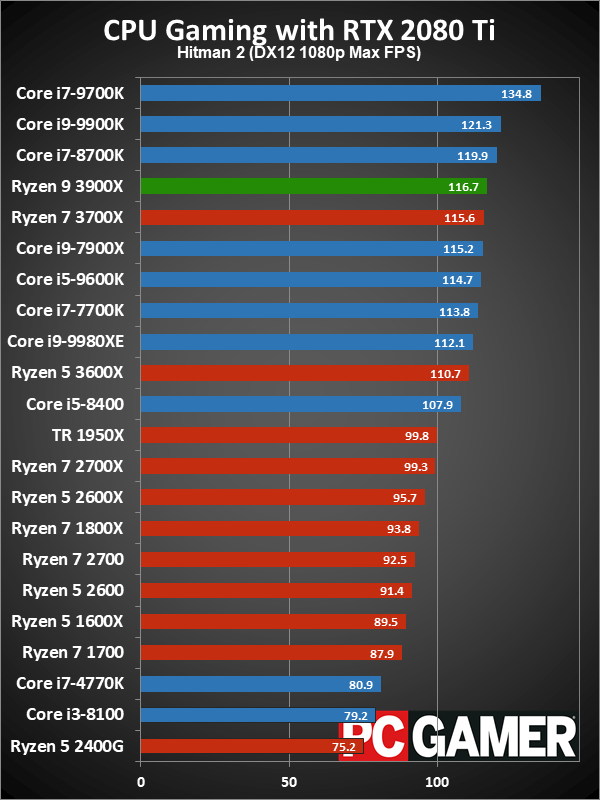
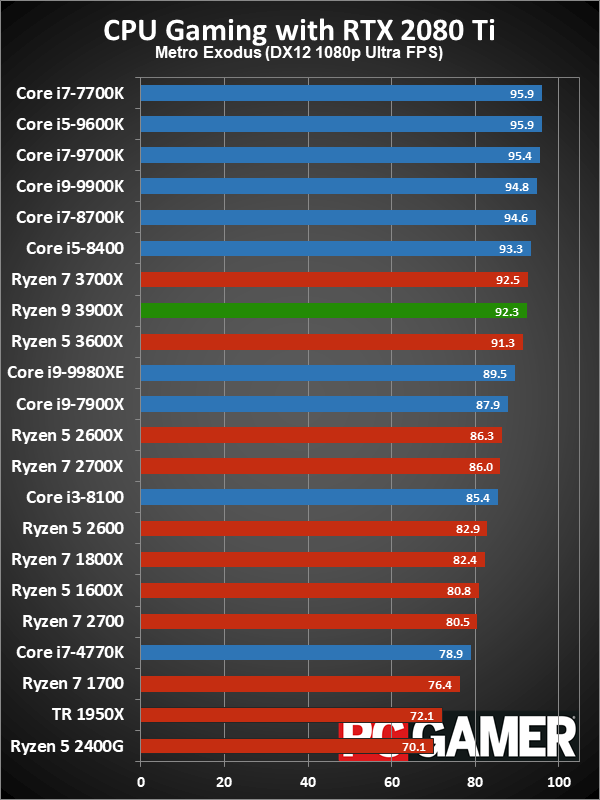
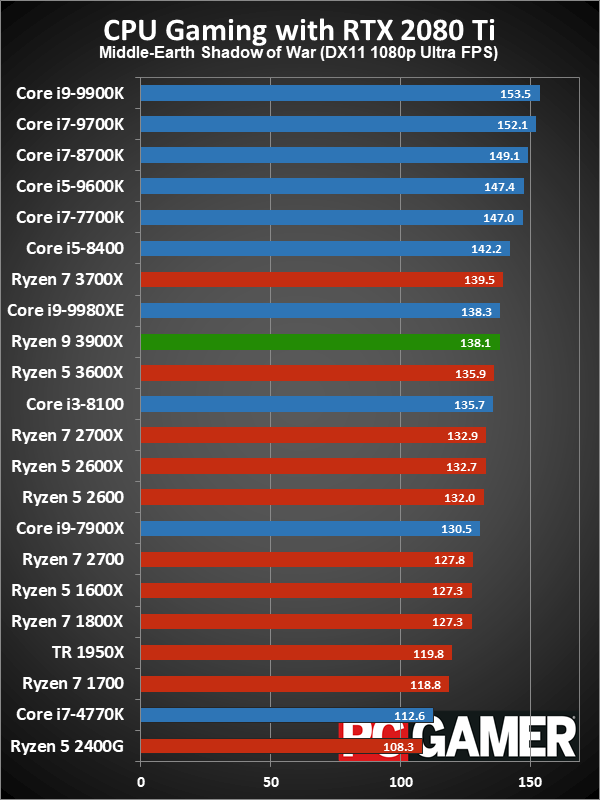
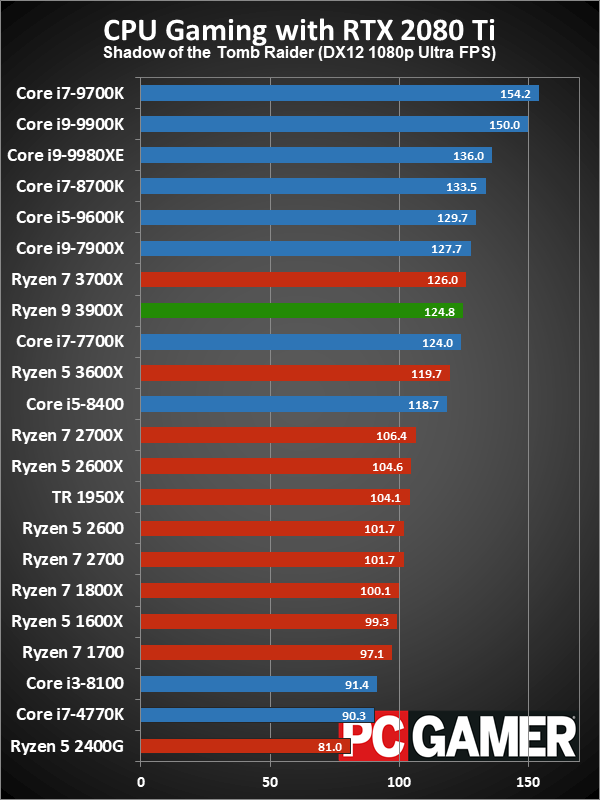
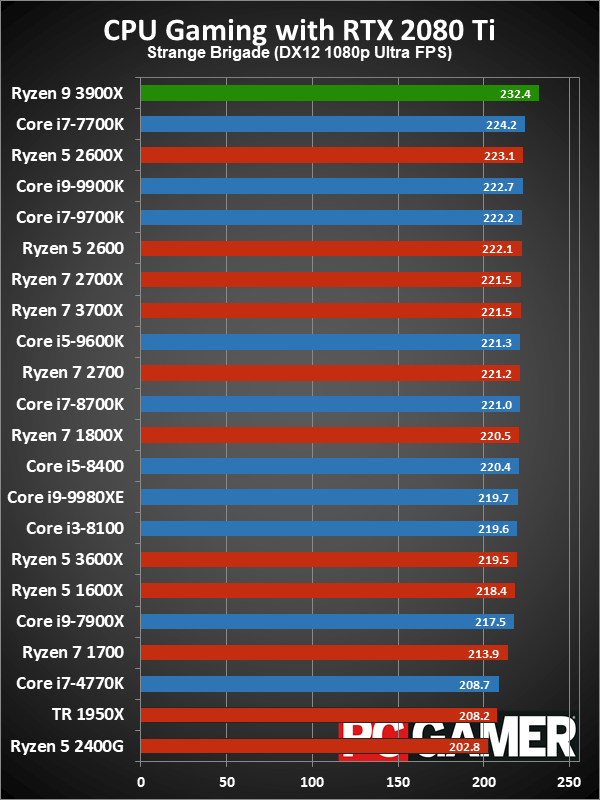
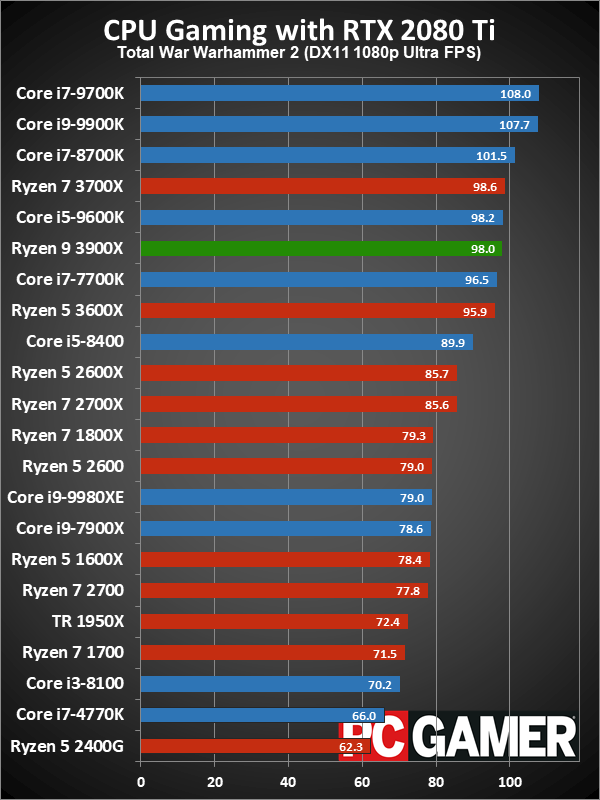
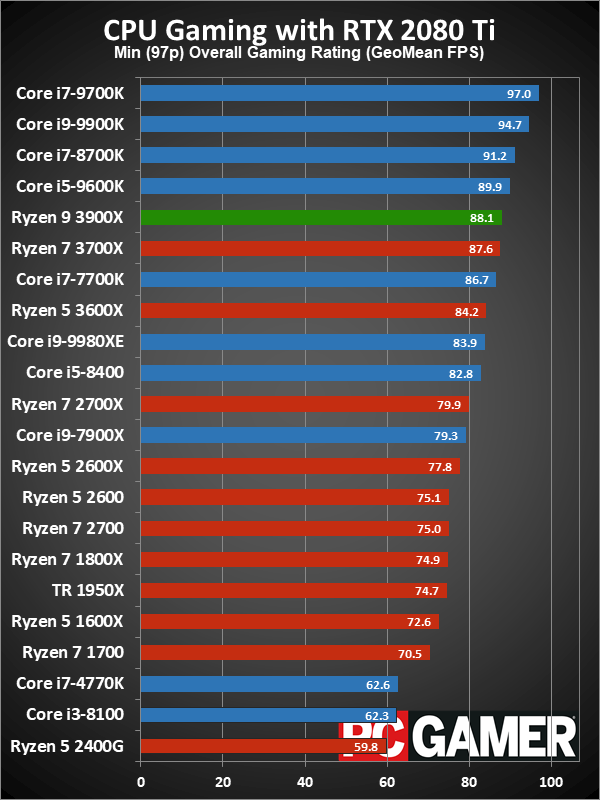
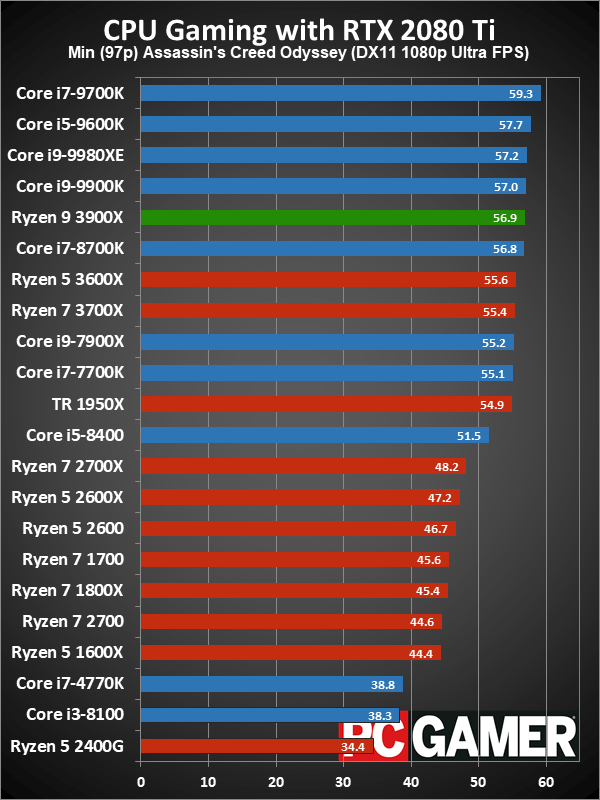
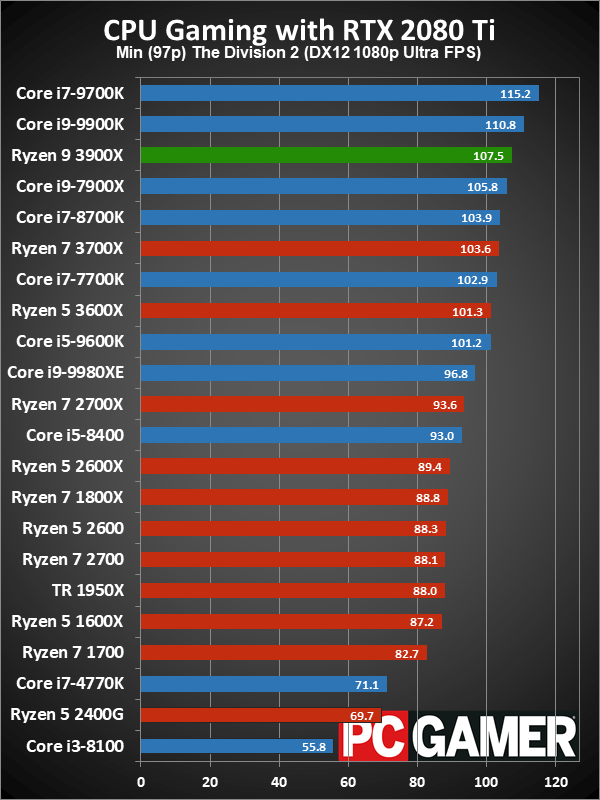
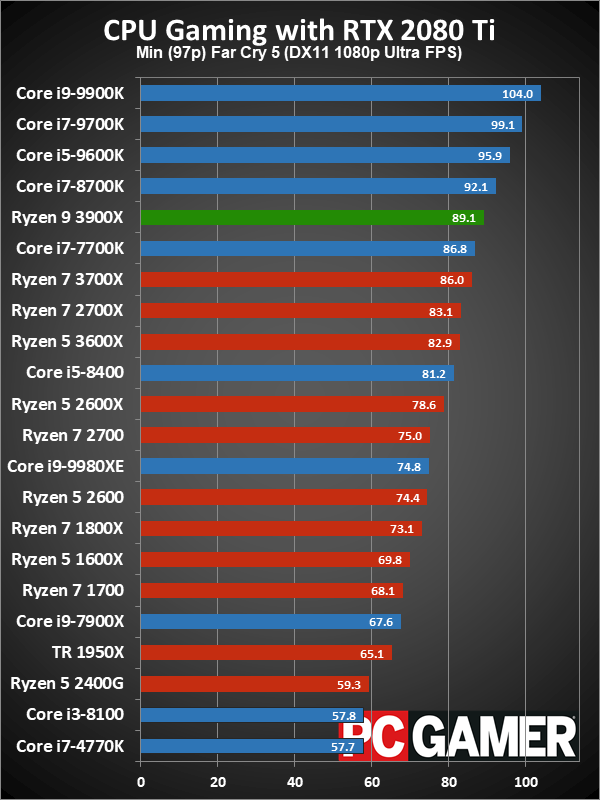
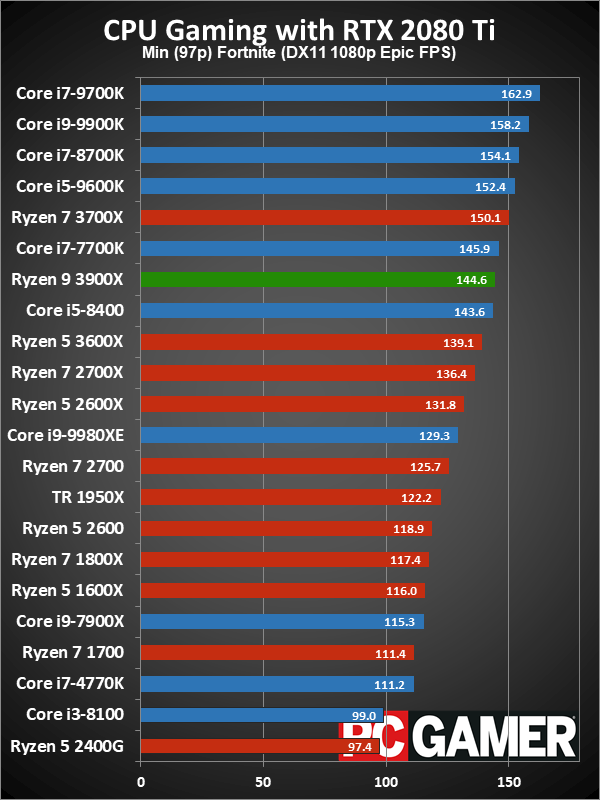
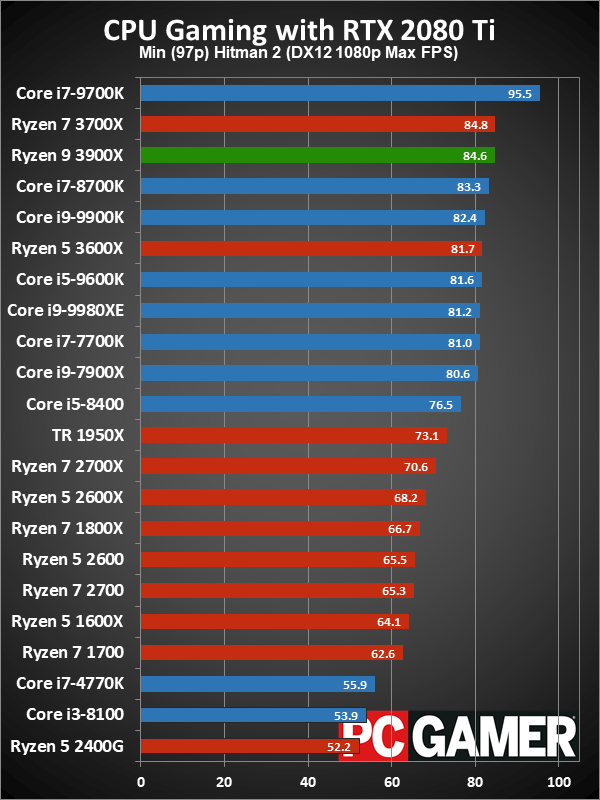
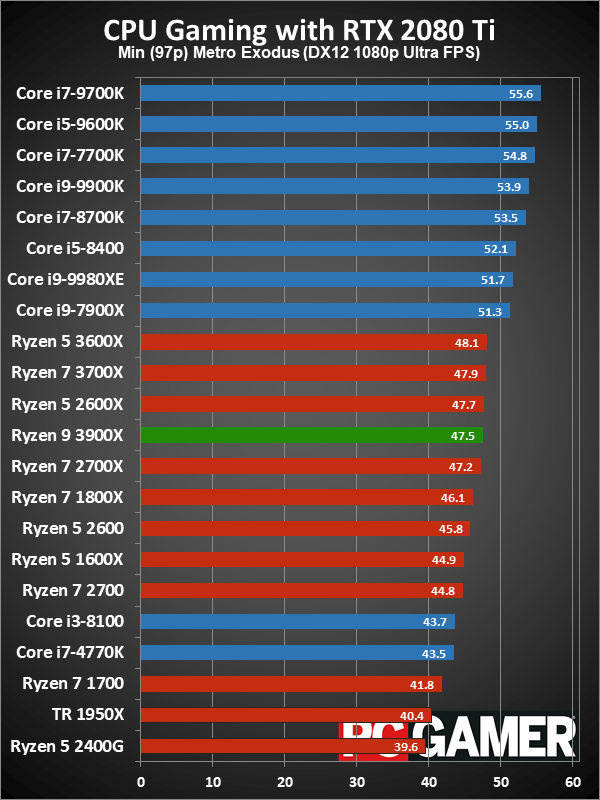
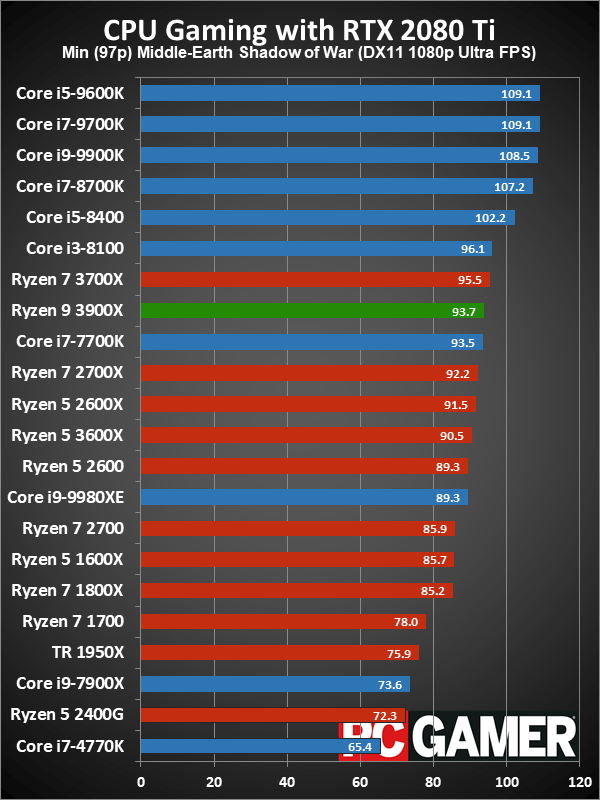
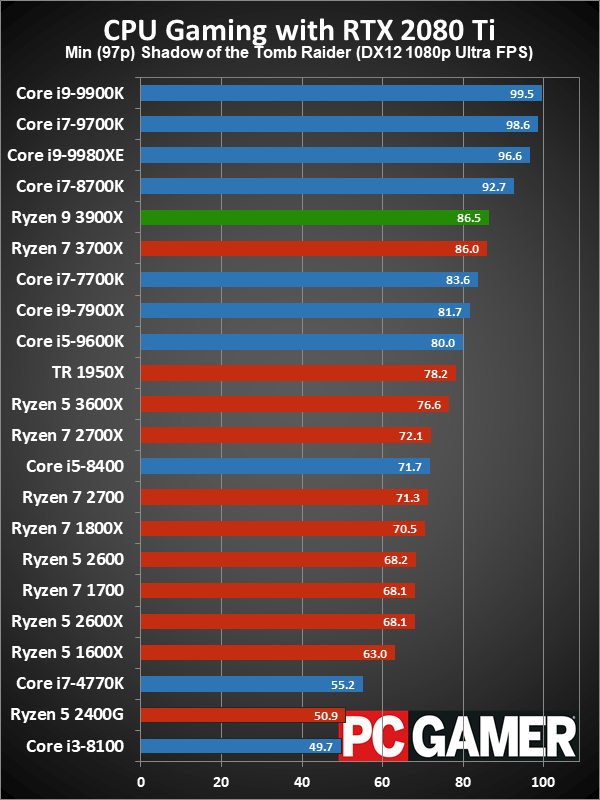
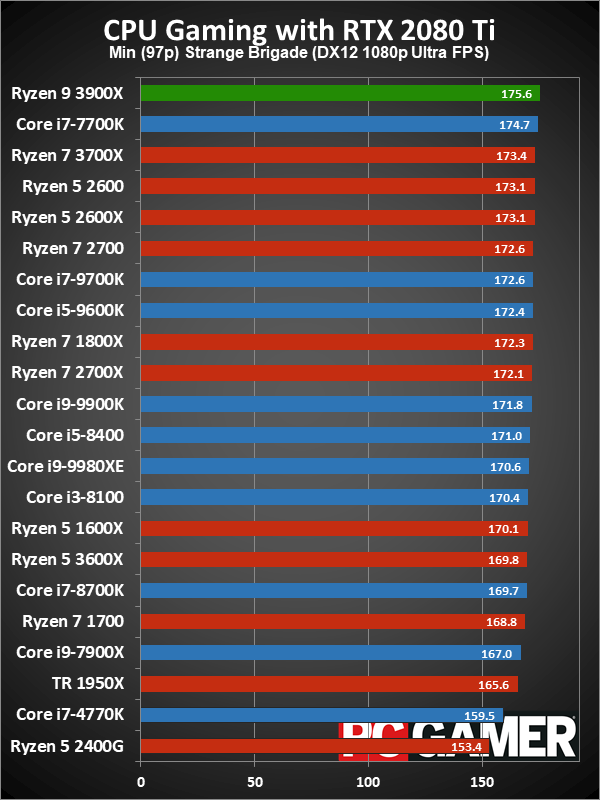
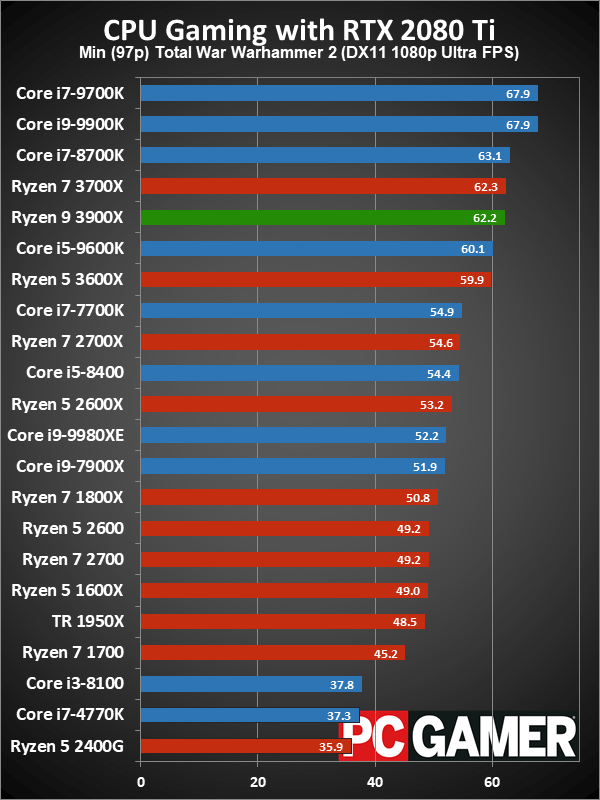
The good news is that gaming performance is improved by nearly ten percent on average relative to the Ryzen 7 2700X. The bad news is that overall the Core i9-9900K is still about ten percent faster. The other good news is that this difference between AMD and Intel CPUs when it comes to gaming performance really only matters if you're running at 1080p ultra with an RTX 2080 Ti—maybe you're aiming for 144fps and above.
If you run a slightly slower GPU, even an RTX 2080 or 2070 Super, the gaming performance gap between the CPUs will shrink. Running at 1440p or 4K will also shrink the gap—4K is basically a 20-way tie, and 1440p with an RTX 2080 or slower would likewise be a tie among all the decent CPUs.
That's not to say that Intel's CPUs aren't faster—they are. Even the Core i7-7700K and Core i5-9600K come out just ahead of the Ryzen 9 3900X in our test suite. But AMD does beat Intel's i9-9980XE, if you're thinking about a $2,000 CPU for gaming purposes. It's pretty consistent across games at settings where we're at least somewhat CPU limited, and in cases where you're GPU limited it's as fast as any other CPU.
There are certainly games where AMD CPUs do better, and games where they do worse, but four of the ten games tested boldly declare AMD Ryzen/Radeon branding, so this is a pretty fair representation of how third gen Ryzen stacks up to Intel's 8th and 9th Gen Core desktop CPUs in terms of gaming performance at CPU limited settings.
AMD loses in absolute gaming performance (on a PC without tons of junk running in the background), but not by much.
Ryzen 9 3900X application performance
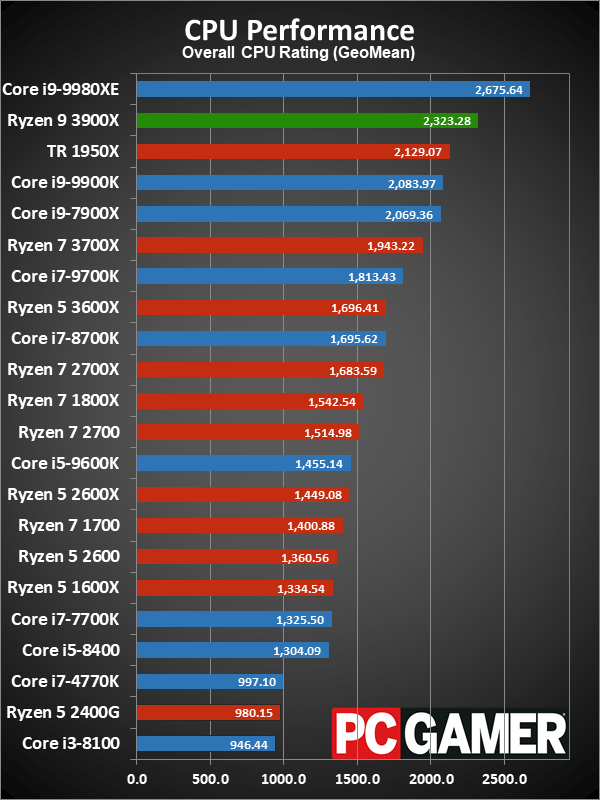
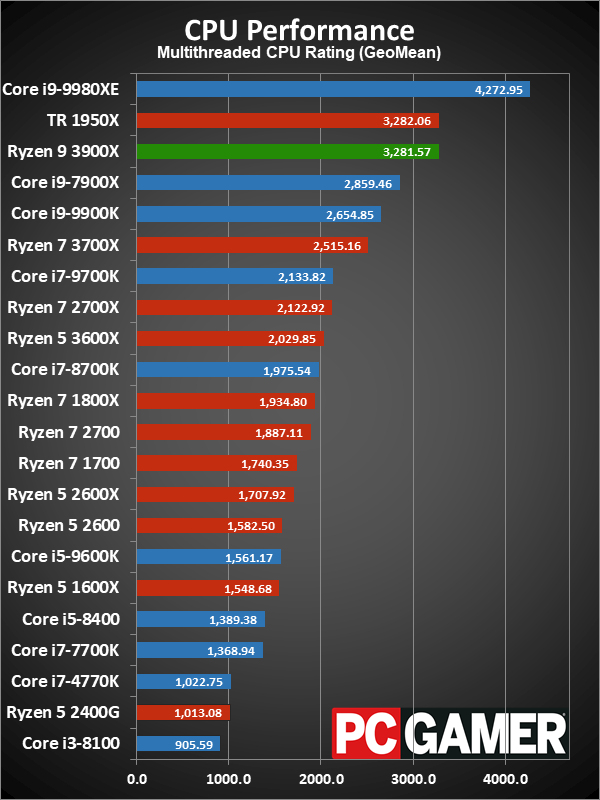
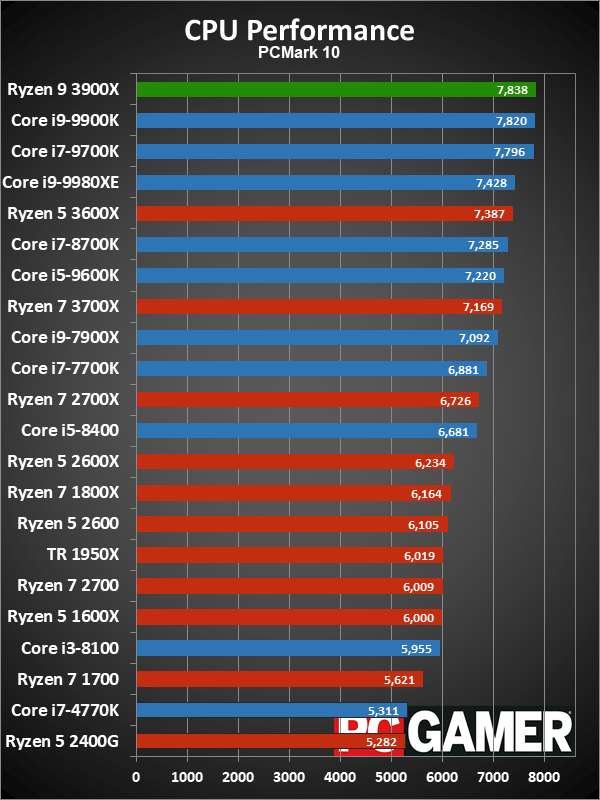
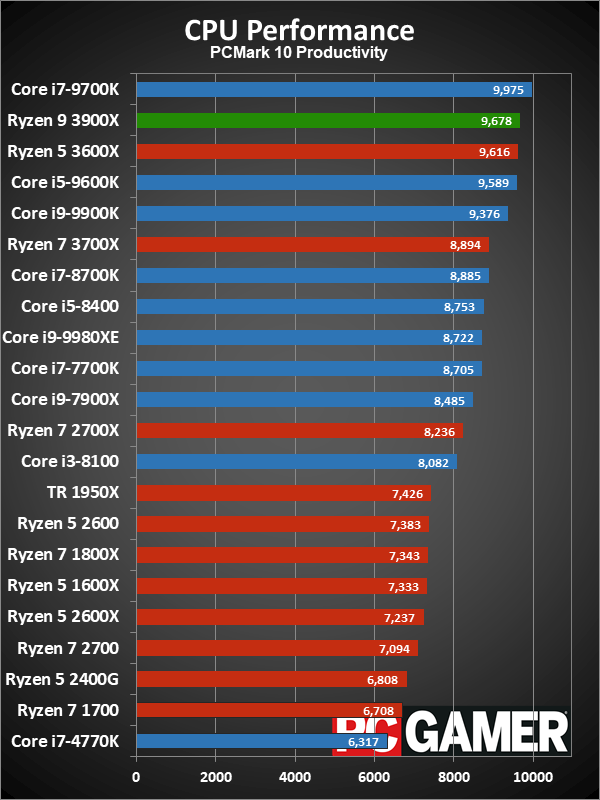
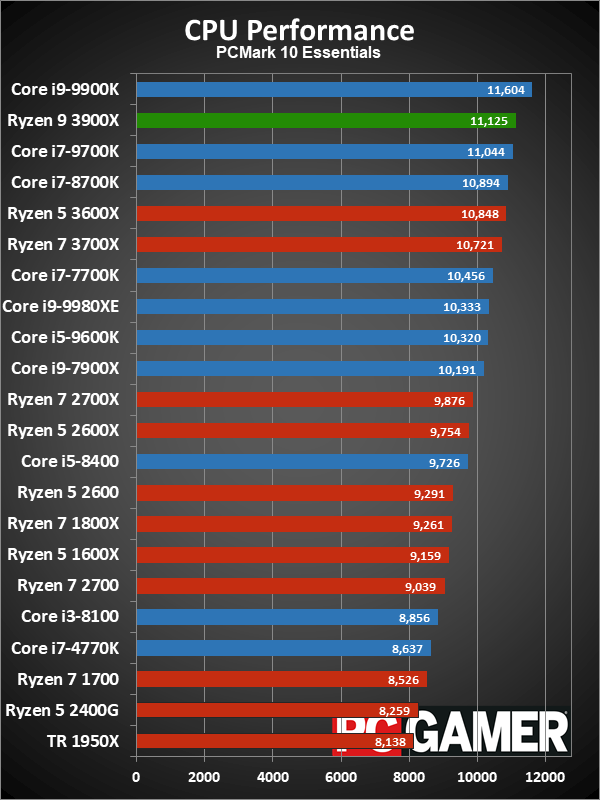
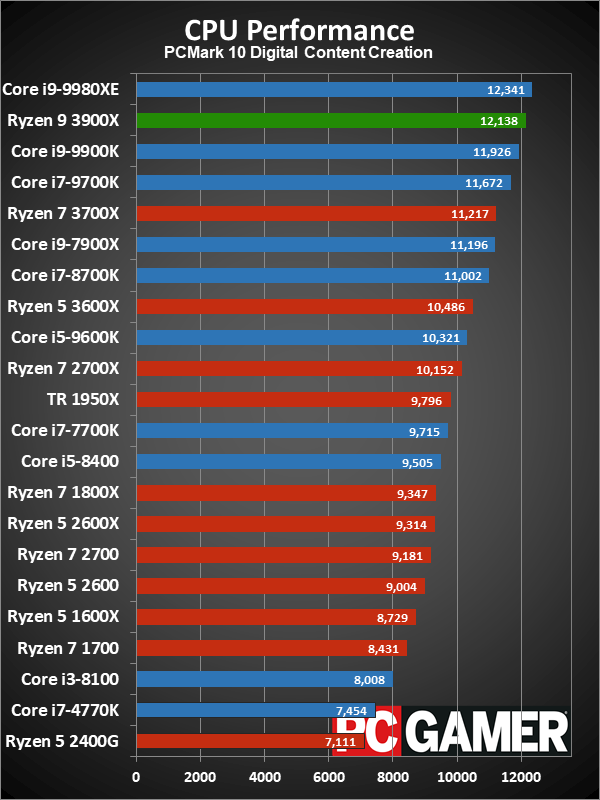
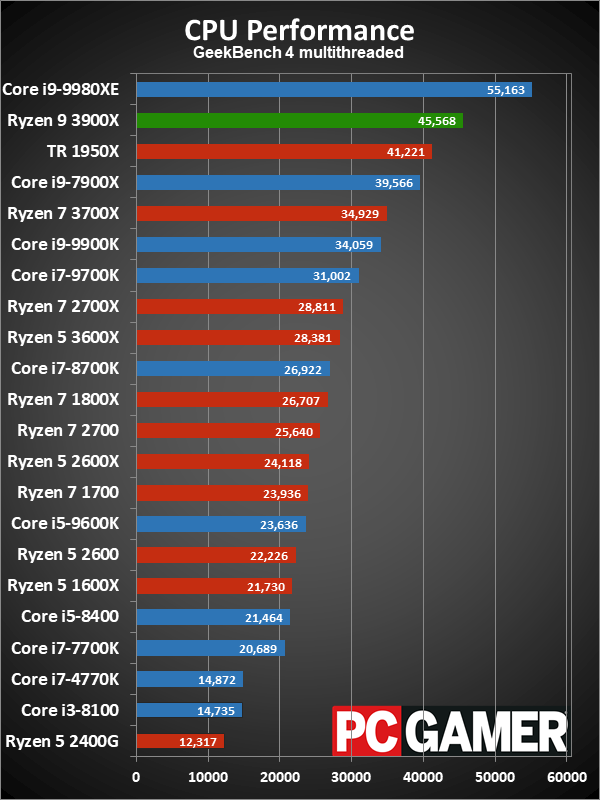
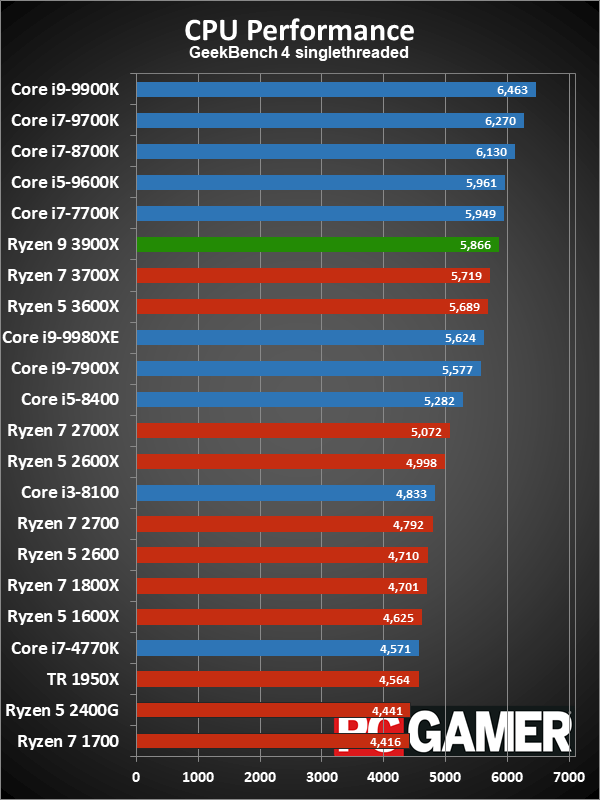
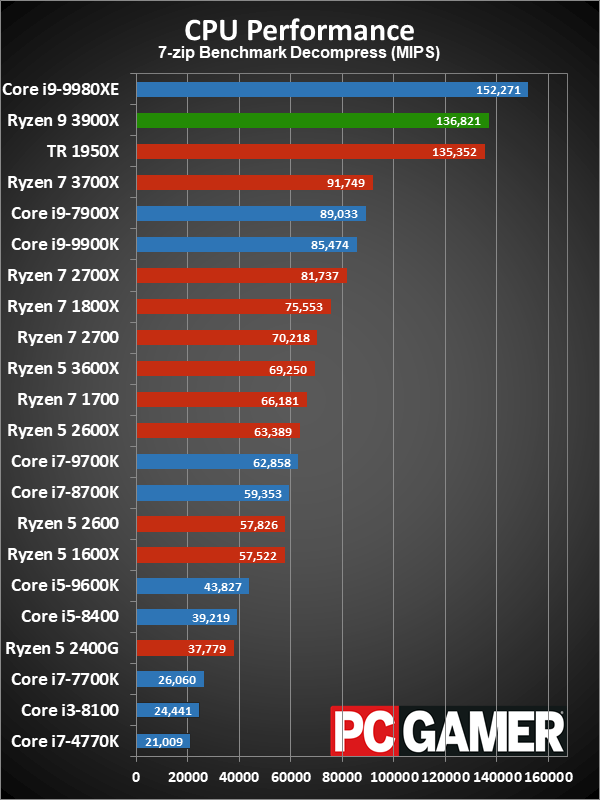
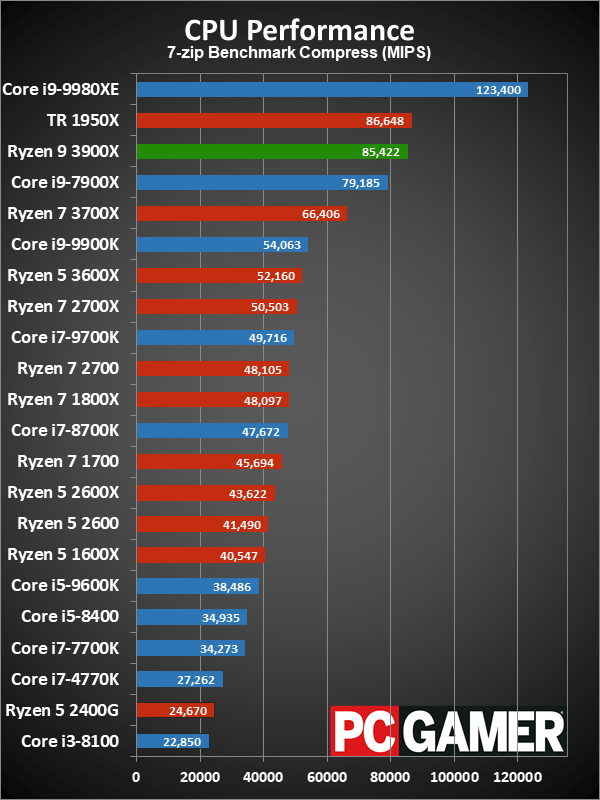
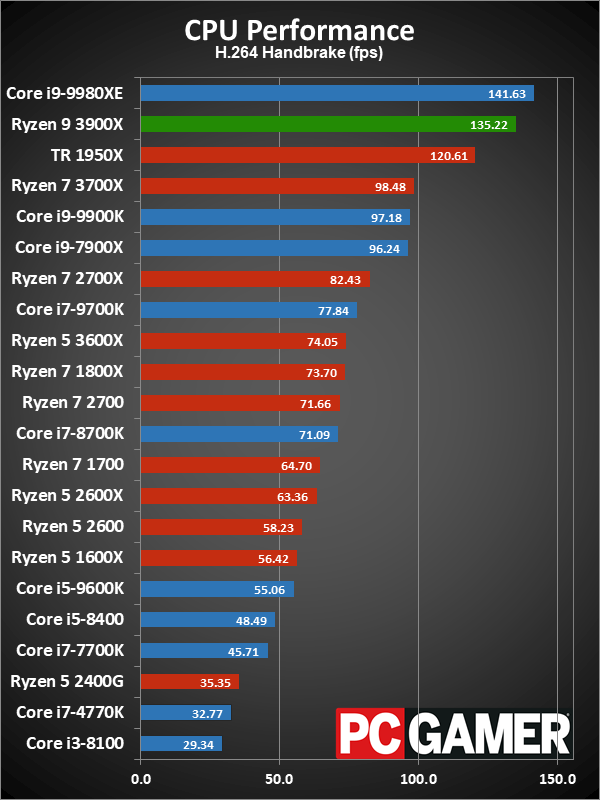
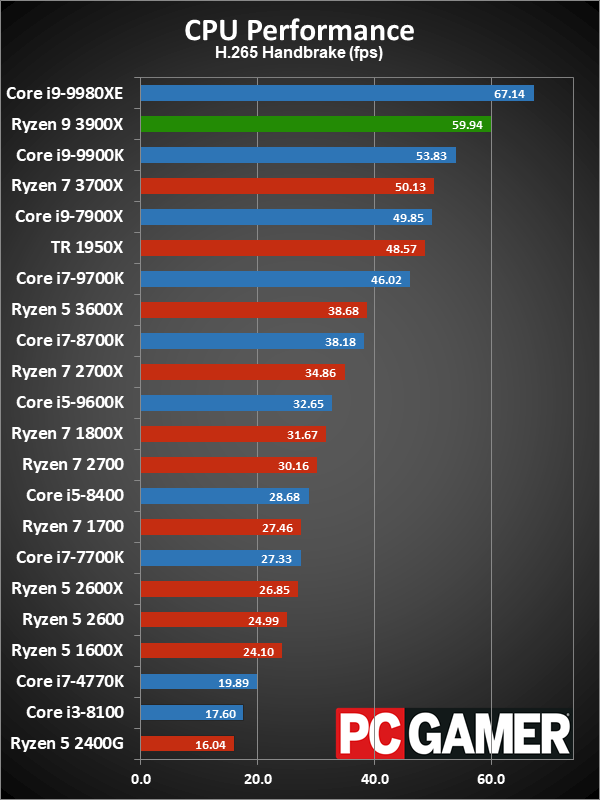
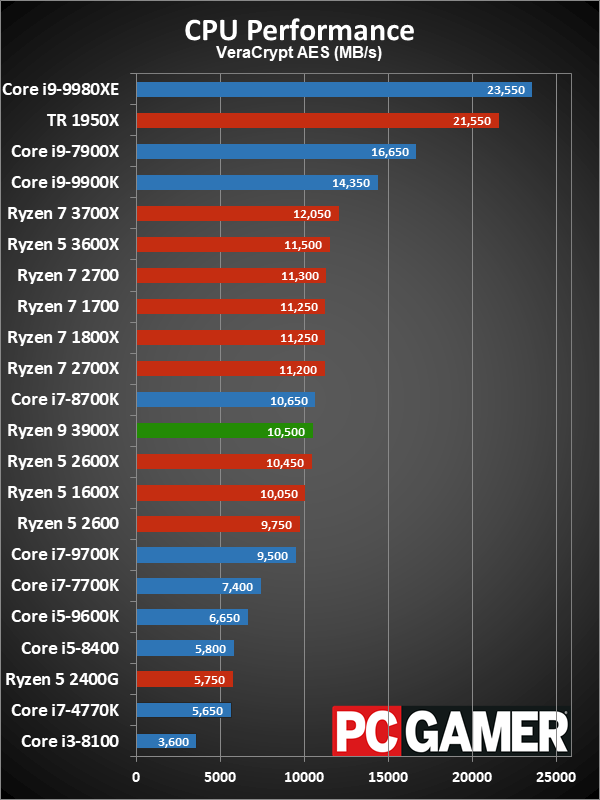
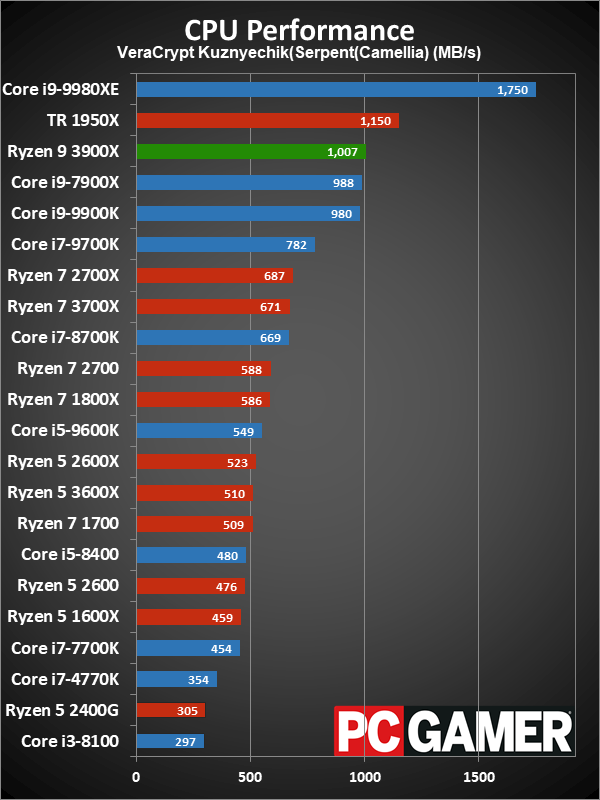
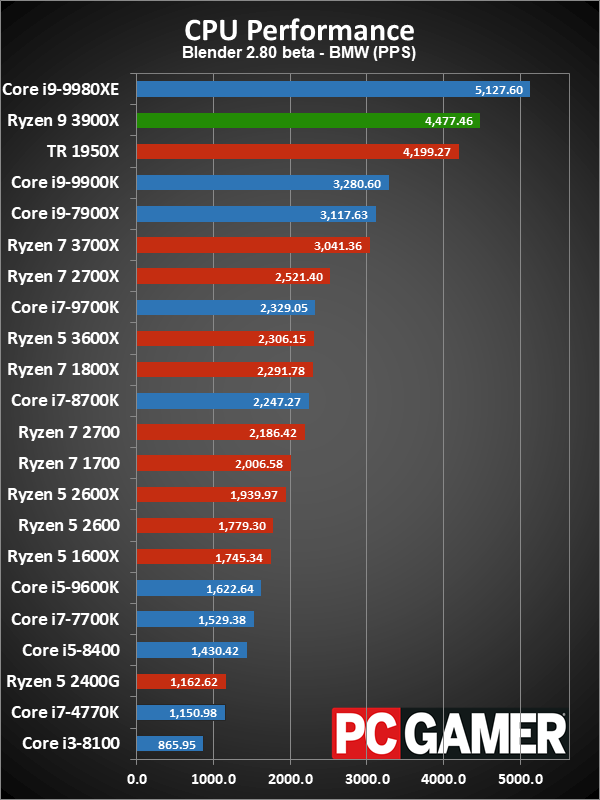
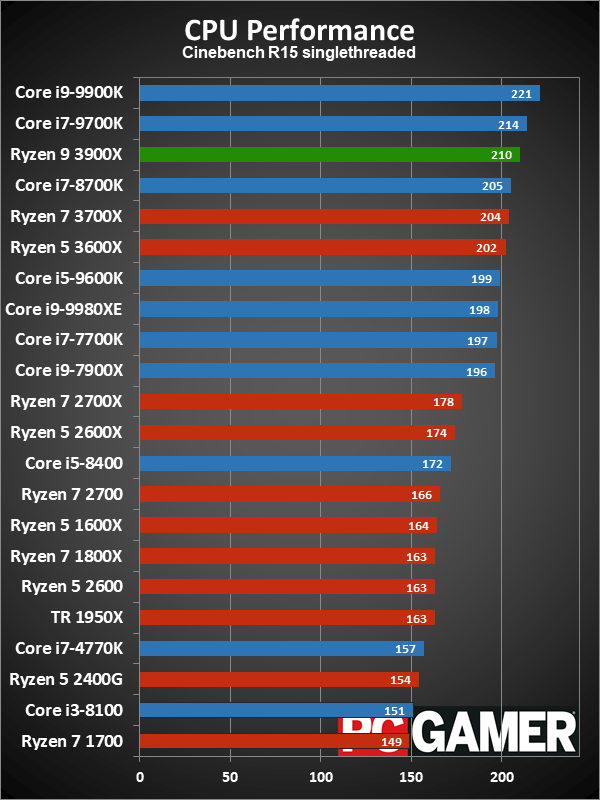
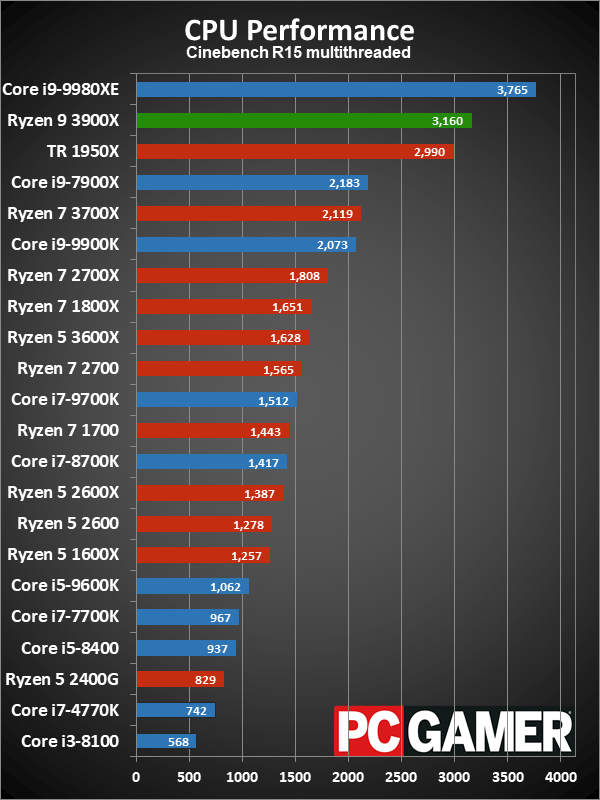
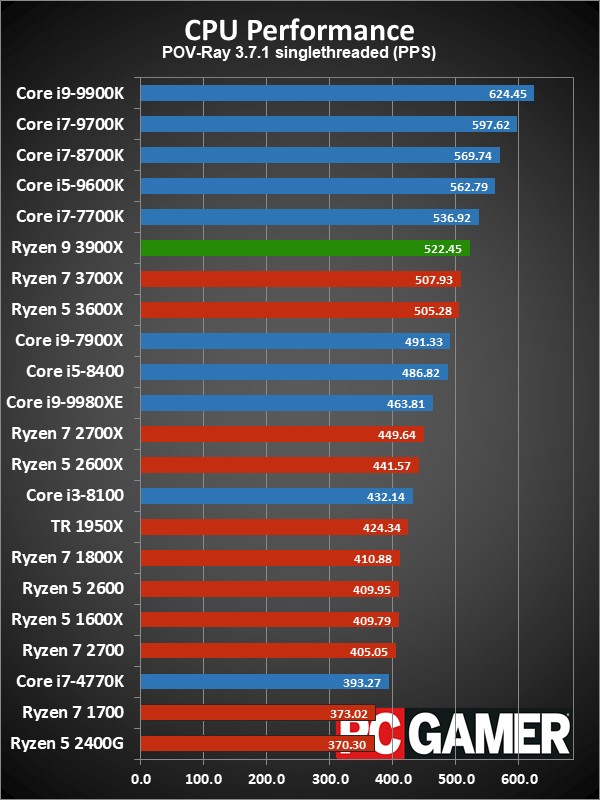
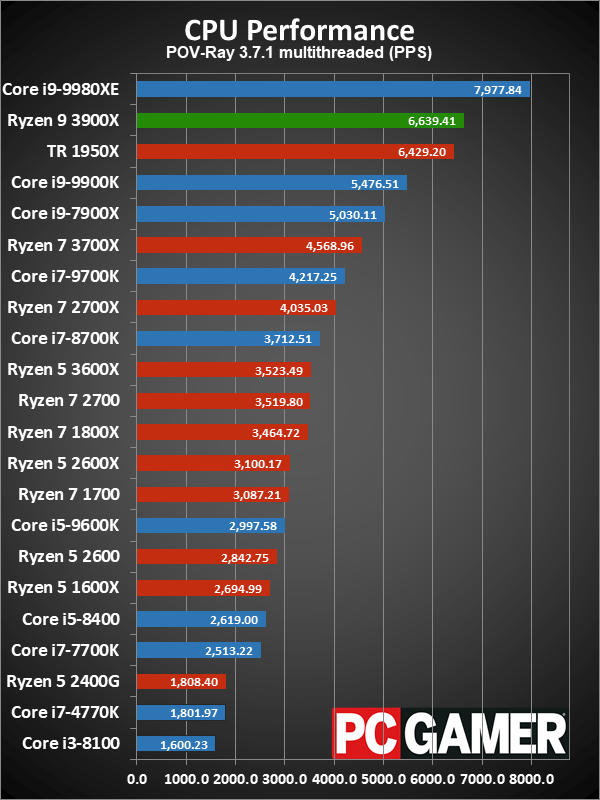
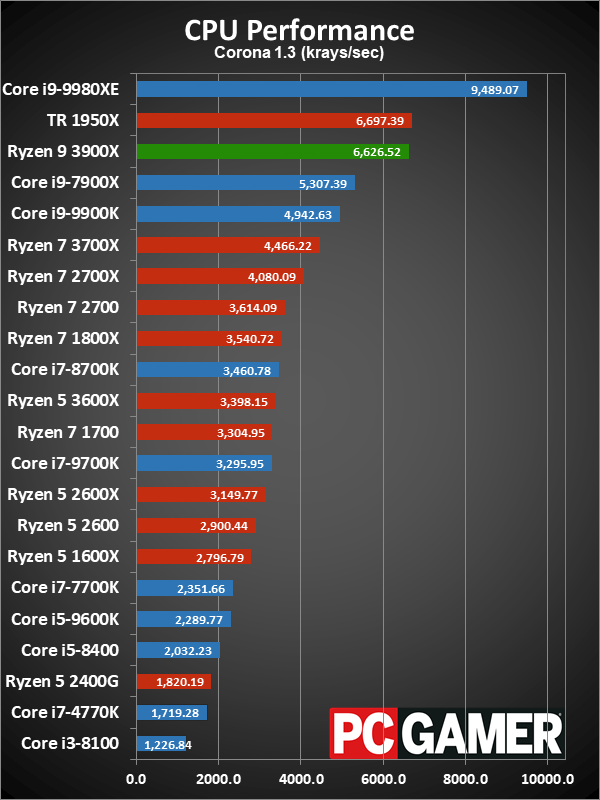
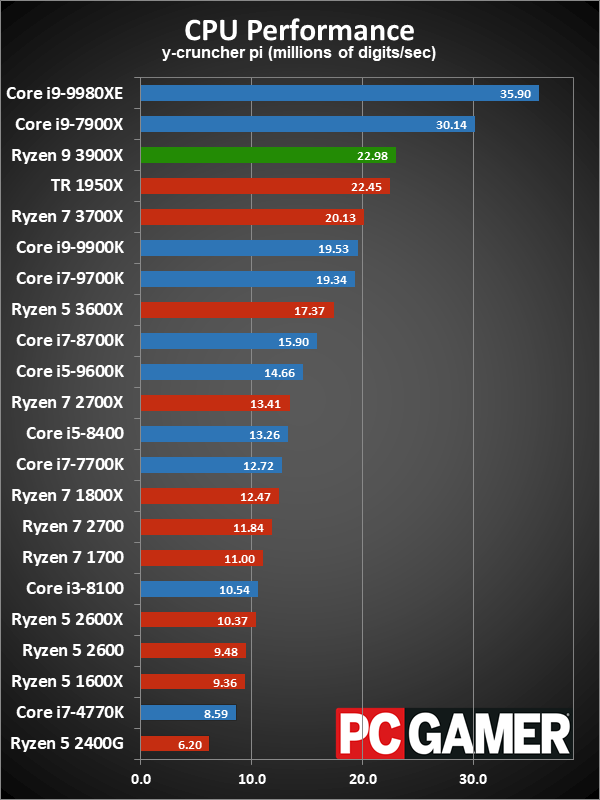
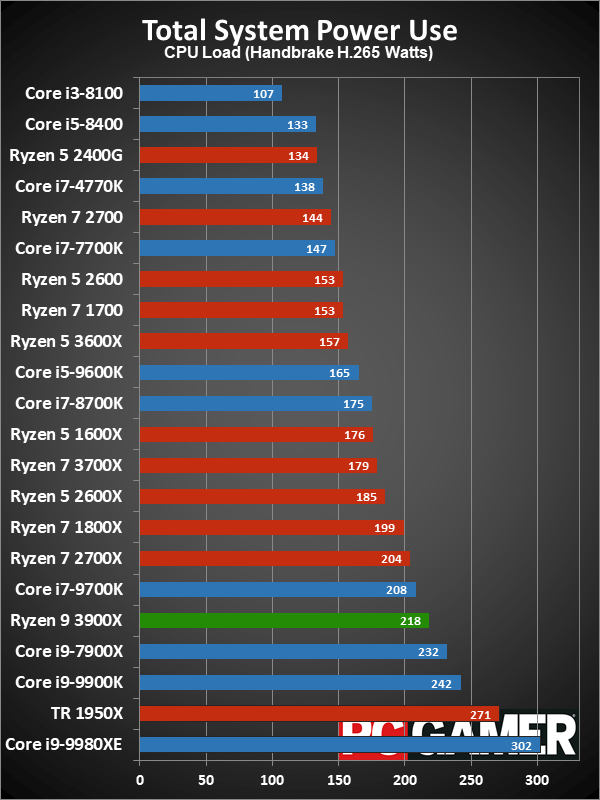
The other side of the coin is non-gaming performance, and here AMD makes some massive inroads against Intel. The Core i7-8700K overall was slower than the Ryzen 7 2700X last year, which is why Intel released the Core i9-9900K. That gave Intel the lead for 8-core processors, but toss in the 12-core/24-thread Ryzen 9 3900X and it's not even close: AMD's 3900X is 21 percent faster than Intel's i9-9900K, at the same nominal price. (Intel is more expensive because you need an aftermarket cooler, though right now it's difficult to find the 3900X in stock for $499.)
Factoring gaming and singlethreaded performance into the mix, AMD's Ryzen 9 3900X still claims a 9 percent lead over the i9-9900K. Intel leads just slightly in games and singlethreaded tests (because the 9900K runs at 5GHz vs. AMD's 4.6GHz), but with 50 percent more cores AMD easily comes out on top.
How much do those differences really matter? It depends on how you use your PC. I know a ton of people that never do any form of 3D rendering, which means four of the multithreaded tests I've included are basically meaningless. Even video encoding (or transcoding) isn't something that 'most' people do on a regular basis. It's very important for streamers and video professionals, but not really a critical item for a lot of users. If it takes five minutes instead of six minutes to encode a video, but still takes 15 minutes to upload the result to YouTube, does the one minute saved really matter? There are also a few oddities—VeraCrypt AES performance looks quite poor on the 3900X for some reason (application or architecture, I couldn't say).
The reality is that most non-enthusiasts (and non-professionals) likely wouldn't notice a difference between any of the Core i5/i7/i9 and Ryzen 5/7/9 products in the charts in day to day use. We've definitely hit a plateau in terms of what 'typical' people ask of their computers.
But again, that's not to say AMD's new Ryzen 9 3900X isn't clearly faster than any mainstream Intel CPU when it comes to multithreaded performance. It easily wins, sometimes by 30 percent or more. On the other hand, of the three singlethreaded tests included in our results, the i9-9900K wins by eight to 17 percent. The Geekbench 4 result uses a wider set of workloads and has Intel leading by ten percent, but it's mostly a synthetic test so keep that in mind.
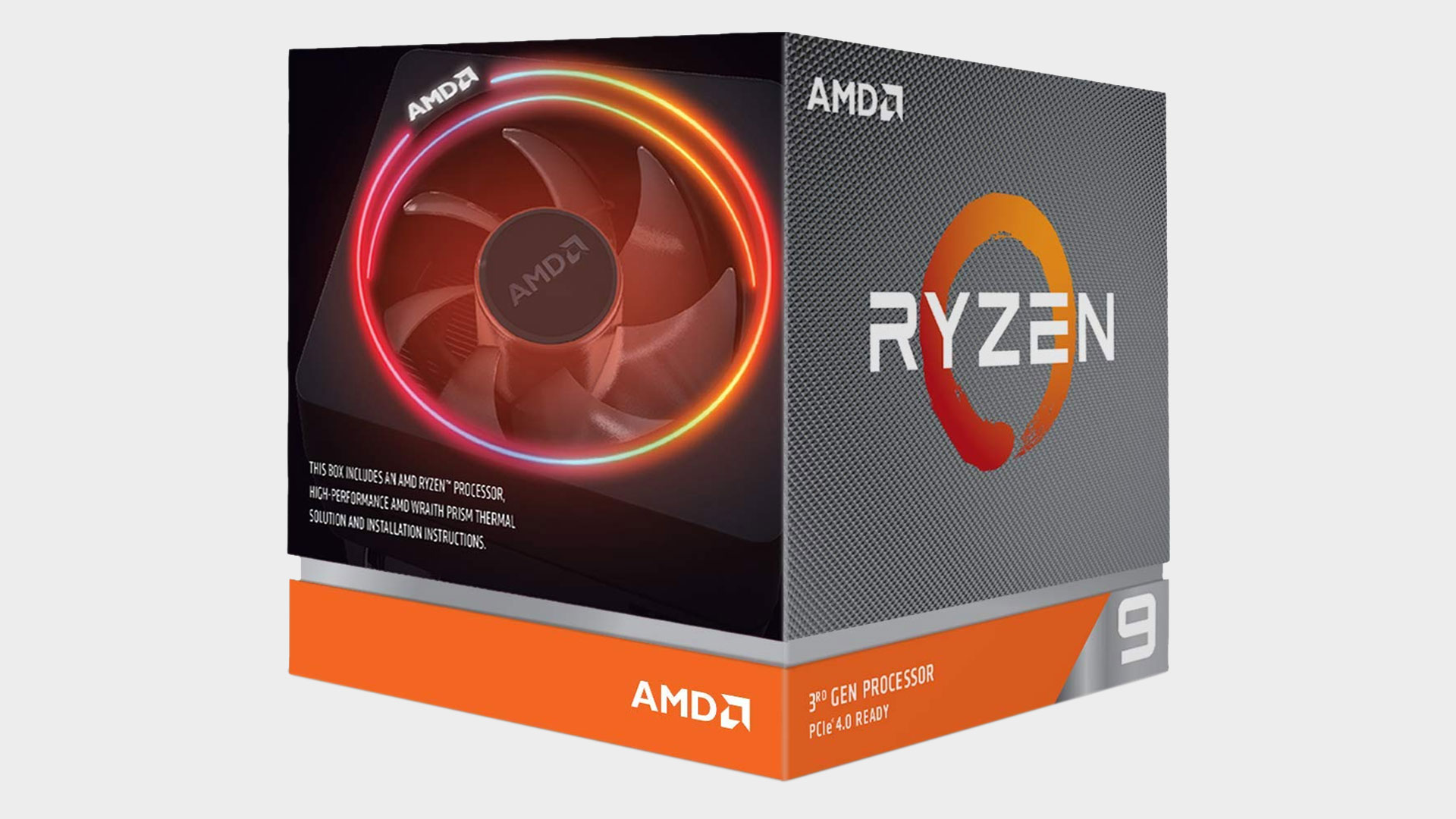
Ryzen 9 3900X is one of the best CPUs in years
As a value proposition, it's easy to love AMD and its Ryzen processors. Intel sat around making 4-core/8-thread as its top 'mainstream consumer' solution for seven years when AMD wasn't competitive. Then Ryzen comes along and delivers 8-core/16-thread solutions to the masses, and suddenly Intel starts selling 6-core and 8-core mainstream processors.
With Ryzen 9 3900X, AMD keeps the pressure on, delivering higher clockspeeds and better latency than its previous generation, with a 12-core/24-thread CPU for the same price as Intel's 8-core/16-thread CPU. The 3900X is so good that it makes the Threadripper and Intel LGA2066 processors pointless for most users, especially considering the price premium.
If you're wondering why the i9-9980XE and Threadripper are in the charts, it's not to show how good Intel is but rather how bad the HEDT platforms look. The 9980XE is four times the price, double the power use, and only 15 percent better overall performance, 30 percent better multithreaded performance, and overall worse gaming performance. Yeah, I'm not buying or recommending that either.
Unless gaming performance and specifically high framerate gaming is your overriding goal, AMD's third gen Ryzen CPUs are now in the lead. For all the people buying Radeon RX 5700 XT and lower graphics cards, or GeForce RTX 2080 and below from Nvidia, any differences in CPU performance when it comes to gaming are going to be mostly meaningless. A few percent slower or faster won't really matter, and future games will likely push beyond the point where 4-core/8-thread and 6-core/6-thread CPUs are all that's needed.
If you've been debating between an AMD or Intel rig for your next PC build, AMD is generally the better pick now.
If you've been debating between an AMD or Intel rig for your next PC build, AMD is generally the better pick now. You get excellent multithreaded performance, gaming performance is close enough that only benchmarks or extremely competitive gamers would likely even notice (and then only with an extreme GPU like a 2080 Ti), and price and features are also in AMD's favor.
In addition, you get PCIe Gen4 (it doesn't really matter for most people, but like Nvidia's ray tracing support, I'd rather have it than not going forward), you get a dedicated x4 PCIe connection for your primary M.2 NVMe SSD, you get more cores, you even get lower power use. And so far (knock on wood), all of the side-channel attack exploits like Spectre, Foreshadow, MDS, and Fallout target Intel CPUs and don't work on AMD's CPUs. All of that at equivalent or lower prices than you'd pay for Intel.
Probably the most important factor is what you're currently using for a PC, and what you plan to do. I've still got an old Core i7-965 PC that my family uses, and it does everything my wife needs. (But it's too slow for me!) And that PC is faster than most of the PCs that my extended family is running. Ouch.
For home and office use, even modest PCs that are five or more years old still continue to work. But if you're an enthusiast or professional and you want more cores and better performance, it's time to ditch any pre-Ryzen AMD CPU or Intel 7th Gen or earlier processors. For CPU enthusiasts, the Ryzen 9 3900X is one of the best CPUs ever. Unfortunately, it remains hard to find in stock, but be patient and you can have the 3900X for $500, which is a great price for this much computing power.
The Ryzen 9 3900X is easily the most compelling enthusiast CPU from AMD in the past 15 years. It can do everything you need and then some, even if it's marginally slower in some games.
Jarred's love of computers dates back to the dark ages when his dad brought home a DOS 2.3 PC and he left his C-64 behind. He eventually built his first custom PC in 1990 with a 286 12MHz, only to discover it was already woefully outdated when Wing Commander was released a few months later. He holds a BS in Computer Science from Brigham Young University and has been working as a tech journalist since 2004, writing for AnandTech, Maximum PC, and PC Gamer. From the first S3 Virge '3D decelerators' to today's GPUs, Jarred keeps up with all the latest graphics trends and is the one to ask about game performance.
